Special Issues Now Accepting Submissions
Camera-based Health Monitoring in Hospitals
Submission Deadline: 01 December 2024
Remote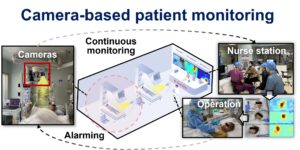 cameras have been used to measure physiological signals from human face and body, thereby eliminating mechanical contact with the skin like wearable sensors. Advancements in biomedical optics, computer vision and AI enabled various camera-based measurements, including vital signs like heart rate, respiration rate, SpO2, blood pressure, perfusion index and physiological markers/indicators that have diagnostic capabilities. Image and video analysis also permit the measurement of human semantics and behaviours that provide new insights into health informatics (e.g. facial analysis for pain or delirium assessment), which is an unique advantage of camera sensors as compared to contact-based biomedical sensors. Camera-based health monitoring will bring a rich set of compelling healthcare applications that directly improve upon contact-based monitoring approaches in hospital care units (e.g. ICU, NICU), improving patients’ care experience and quality of treatment. After years of R&D in this field, it is time to bring the concepts and prototypes (including setups and algorithms) one step further to the hospitals to demonstrate their actual performance and values via clinical trials. This is an important step towards the transformation of camera-based monitoring technology into a medical device. This special issue focuses on the latest developments and clinical showcases pertaining to Camera-based Health Monitoring in Hospitals, specifically on innovation, validation and demonstration in clinical environments.
cameras have been used to measure physiological signals from human face and body, thereby eliminating mechanical contact with the skin like wearable sensors. Advancements in biomedical optics, computer vision and AI enabled various camera-based measurements, including vital signs like heart rate, respiration rate, SpO2, blood pressure, perfusion index and physiological markers/indicators that have diagnostic capabilities. Image and video analysis also permit the measurement of human semantics and behaviours that provide new insights into health informatics (e.g. facial analysis for pain or delirium assessment), which is an unique advantage of camera sensors as compared to contact-based biomedical sensors. Camera-based health monitoring will bring a rich set of compelling healthcare applications that directly improve upon contact-based monitoring approaches in hospital care units (e.g. ICU, NICU), improving patients’ care experience and quality of treatment. After years of R&D in this field, it is time to bring the concepts and prototypes (including setups and algorithms) one step further to the hospitals to demonstrate their actual performance and values via clinical trials. This is an important step towards the transformation of camera-based monitoring technology into a medical device. This special issue focuses on the latest developments and clinical showcases pertaining to Camera-based Health Monitoring in Hospitals, specifically on innovation, validation and demonstration in clinical environments.
AI-Generated Content-Based Healthcare – Transforming the Landscape of Patient Care and Medical Services
Submission Deadline: 01 May 2024
The rapid evolution of artificial intelligence in content-based healthcare marks a transformative era, offering extensive  opportunities for stakeholders to pioneer innovative concepts that push the boundaries of feasible healthcare solutions.
opportunities for stakeholders to pioneer innovative concepts that push the boundaries of feasible healthcare solutions.
Fusion of Artificial Intelligence and Metaverse Technologies for Personalized and Predictive Healthcare Capabilities
Submission Deadline: 30 November 2024
The faster maturity and stability of prominent metaverse technologies (AR, VR, Web 3.0, Blockchain, 5G Advanced, Edge Computing, etc.) associated with pioneering AI algorithms 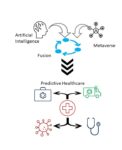 have laid a stimulating foundation for realizing digitally transformed industry houses. Healthcare is being touted as the forefront of getting thoroughly disrupted and transformed through this strategically sound fusion of metaverse and AI. This unique combination has the innate strength to open up unprecedented opportunities for envisaging and realizing advanced healthcare facilities. Medical electronics, instruments, scanners, and equipment data gets collected, cleansed, and crunched locally by embedded and efficient AI models. This on-device data processing emits actionable insights in time. Thereby smart hospital environments can be set up and sustained. Real-time intelligent healthcare services can be dynamically developed and delivered to patients, doctors, surgeons, medical scientists, and experts. Healthcare providers can access all kinds of medical and patient data with the metaverse. Metaverse technologies and tools elegantly fulfill sharing, personalization, and collaboration requirements. Medical education is to see a drastic shift with the blending of metaverse and AI. This convergence promotes language learning, coding/programming education, teaching support, student engagement, higher-order thinking, and collaborative learning. Integrating these state-of-the-art technologies can improve medical literacy, personalized patient care, and better health outcomes. This special issue seeks to bring together research that explores the various facets of this fusion and its implications for healthcare, medical education, and beyond.
have laid a stimulating foundation for realizing digitally transformed industry houses. Healthcare is being touted as the forefront of getting thoroughly disrupted and transformed through this strategically sound fusion of metaverse and AI. This unique combination has the innate strength to open up unprecedented opportunities for envisaging and realizing advanced healthcare facilities. Medical electronics, instruments, scanners, and equipment data gets collected, cleansed, and crunched locally by embedded and efficient AI models. This on-device data processing emits actionable insights in time. Thereby smart hospital environments can be set up and sustained. Real-time intelligent healthcare services can be dynamically developed and delivered to patients, doctors, surgeons, medical scientists, and experts. Healthcare providers can access all kinds of medical and patient data with the metaverse. Metaverse technologies and tools elegantly fulfill sharing, personalization, and collaboration requirements. Medical education is to see a drastic shift with the blending of metaverse and AI. This convergence promotes language learning, coding/programming education, teaching support, student engagement, higher-order thinking, and collaborative learning. Integrating these state-of-the-art technologies can improve medical literacy, personalized patient care, and better health outcomes. This special issue seeks to bring together research that explores the various facets of this fusion and its implications for healthcare, medical education, and beyond.
Impact of Machine Learning on Personalized Medicine in Public Health
Submission Deadline: 25 July 2024
The integration of advanced analytics and healthcare has opened new horizons in adapting medical measures to individual patients, revolutionizing the field of personalized medicine. 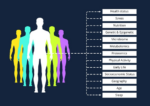 Using algorithms, healthcare professionals can extract invaluable insights and patterns from the data, providing customized solutions based on individual characteristics and needs. Machine learning also plays an important role and has the capability to analyze patient characteristics, genetic factors, and treatment responses, predicting drug reactions, adverse events, and optimal dosage levels. This enables healthcare providers to suggest medicines with minimized side effects, improving therapeutic outcomes further. Additionally, machine learning algorithms can detect early warning signs of disease outbreaks by analyzing multiple data sources such as social media feeds, climate data, and geographical information. From disease prediction to outbreak surveillance, machine learning has the capacity to reshape the landscape of public health, enabling evidence-based decision-making, and ultimately improving health outcomes for individuals and communities. This special issue aims to attract original research papers from professionals in this domain area to provide insights that can shape the future of personalized medicine and improve public health outcomes.
Using algorithms, healthcare professionals can extract invaluable insights and patterns from the data, providing customized solutions based on individual characteristics and needs. Machine learning also plays an important role and has the capability to analyze patient characteristics, genetic factors, and treatment responses, predicting drug reactions, adverse events, and optimal dosage levels. This enables healthcare providers to suggest medicines with minimized side effects, improving therapeutic outcomes further. Additionally, machine learning algorithms can detect early warning signs of disease outbreaks by analyzing multiple data sources such as social media feeds, climate data, and geographical information. From disease prediction to outbreak surveillance, machine learning has the capacity to reshape the landscape of public health, enabling evidence-based decision-making, and ultimately improving health outcomes for individuals and communities. This special issue aims to attract original research papers from professionals in this domain area to provide insights that can shape the future of personalized medicine and improve public health outcomes.
Deep Learning Techniques for Automated Diagnosis and Treatment Planning in Bioinformatics
Submission Deadline: 05 May 2024
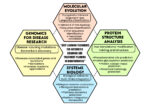 The aim of this Special Issue is to explore and showcase the latest advancements in automated diagnosis and treatment planning using deep learning techniques and models. In this special issue, we hope to foster interdisciplinary collaborations and promote the development of innovative solutions to the challenges faced in this field by bringing together researchers from diverse backgrounds including computer science, bioinformatics and clinical domains. We also encourage submissions that present novel approaches, experimental validations, and practical applications in deep learning for bioinformatics, with an emphasis on addressing data scarcity, interpretability, and generalizability.
The aim of this Special Issue is to explore and showcase the latest advancements in automated diagnosis and treatment planning using deep learning techniques and models. In this special issue, we hope to foster interdisciplinary collaborations and promote the development of innovative solutions to the challenges faced in this field by bringing together researchers from diverse backgrounds including computer science, bioinformatics and clinical domains. We also encourage submissions that present novel approaches, experimental validations, and practical applications in deep learning for bioinformatics, with an emphasis on addressing data scarcity, interpretability, and generalizability.
Domain Adaptation and Generalization for Biomedical and Health Informatics
Submission Deadline: 31 May 2024
 In the healthcare domain, despite the notable achievements of deep learning, considerable challenges impede its widespread application. A primary concern revolves around the ability of trained models to generalize and adapt effectively. The inherent heterogeneity of clinical data, stemming from variations in equipment, patient demographics, and acquisition protocols, significantly undermines the resilience of these systems. The aspiration to develop algorithms that consistently perform well across diverse, previously unseen data domains remains a formidable challenge, creating a substantial impediment to the clinical deployment of such technologies. Addressing this pivotal issue necessitates a strategic shift in research focus towards enhancing the domain adaptability and generalization capabilities of deep learning models within the biomedical and health informatics sectors. This special issue serves to underscore the importance of novel applications, algorithms, problems, ideas, datasets, and tools within the domain of transfer learning, with a specific emphasis on biomedical and health informatics.
In the healthcare domain, despite the notable achievements of deep learning, considerable challenges impede its widespread application. A primary concern revolves around the ability of trained models to generalize and adapt effectively. The inherent heterogeneity of clinical data, stemming from variations in equipment, patient demographics, and acquisition protocols, significantly undermines the resilience of these systems. The aspiration to develop algorithms that consistently perform well across diverse, previously unseen data domains remains a formidable challenge, creating a substantial impediment to the clinical deployment of such technologies. Addressing this pivotal issue necessitates a strategic shift in research focus towards enhancing the domain adaptability and generalization capabilities of deep learning models within the biomedical and health informatics sectors. This special issue serves to underscore the importance of novel applications, algorithms, problems, ideas, datasets, and tools within the domain of transfer learning, with a specific emphasis on biomedical and health informatics.Medical information security and privacy solution for smart healthcare industries
Submission Deadline: 31 May 2024
Transforming Healthcare and Medicine with Biomedical Informatics and Emerging AI Techniques
Submission Deadline: 28 June 2024
Join us at the forefront of healthcare’s transformative evolution by contributing to the Special Session, “Transforming Healthcare and Medicine with Biomedical Informatics and Emerging AI Techniques.” We invite you – researchers, practitioners, educators, and policymakers to contribute your insights to this curated collection in the Journal of Biomedical and Health Informatics. This issue seeks to explore the frontier where AI intersects with healthcare, advancing clinical care, decision-making, and precision health. Your submissions will shape the narrative of AI’s role in reshaping clinical care, unraveling complex biomedical data, and navigating ethical considerations within medicine. Together, we aim to curate cutting-edge research, fostering interdisciplinary collaboration and innovation in healthcare informatics.
Leveraging Smart Sensors in Healthcare 4.0
Submission Deadline: 05 May 2024
The new era of connected healthcare services has led to the foundation of innovative technologies to enhance health services towards a healthier lifestyle. Also, the emergence of the IT sector into healthcare has brought tremendous health benefits to the patients and health professionals made this applicable and reliable. The rapid spread of Industrial Revolution 4.0 has admired the health industry, which triggered the evolution of Healthcare 4.0. The rising of enormous potential technologies provided additional support for the trend of Healthcare 4.0. The development of Biosensors using smart technologies improved the sustainability and effectiveness of healthcare services.
The successful functioning of Healthcare 4.0 depends on Information Technology, Cyber security systems, robotics, Artificial Intelligence, and computing besides biological sciences and health informatics. Cloud and Edge computing offer a comparatively secure and accurate platform for the predictive analysis of patient’s health data. Moreover, this advanced healthcare service can correlate the patients’ data with the datasets provided by qualified health professionals. This concept ultimately results in the patient-centred healthcare approaches which help in the betterment of patients. The widespread usage of numerous wearable biosensors and intelligent equipment provides efficient diagnosis and monitoring. Electronic health records are well maintained and efficient billing systems are implemented to prevent cost management issues with the available cutting-edge technologies. Hence, technological contributions for healthcare are noteworthy in supporting health professionals and patients and sensor-based monitoring and rehabilitation processes. Diagnosing diseases and their appropriate treatment within the stipulated period is a challenging part of healthcare services. This circumstance can be satisfied with the strategic application of Healthcare 4.0 with the effective use of these biosensors. From technological development, numerous challenges are identified to achieve Healthcare 4.0. Therefore, this special issue mainly identifies the challenges and research gaps in the existing healthcare services and aspires to invite health professionals and technologists together to resolve these implications. Moreover, propose efficacious sensing strategies for remote healthcare 4.0 applications.
Advancing Healthcare Informatics with Large Language Models
Submission Deadline: 30 June 2024
 Healthcare informatics plays a pivotal role in revolutionizing the healthcare landscape, enhancing patient care, and facilitating clinical research. In recent years, the integration of large language models (LLMs) into healthcare informatics has emerged as a transformative force, offering unprecedented opportunities for analyzing, understanding, and leveraging vast amounts of medical data. This special issue aims to explore the significant advancements, challenges, and potential applications of large language models in the healthcare domain.
Healthcare informatics plays a pivotal role in revolutionizing the healthcare landscape, enhancing patient care, and facilitating clinical research. In recent years, the integration of large language models (LLMs) into healthcare informatics has emerged as a transformative force, offering unprecedented opportunities for analyzing, understanding, and leveraging vast amounts of medical data. This special issue aims to explore the significant advancements, challenges, and potential applications of large language models in the healthcare domain.
Big Data inefficient management of Medical Records for accelerating better treatment
Submission Deadline: 15 June 2024
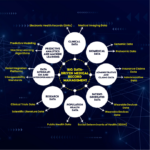 The study summarizes the emerging paradigm of big data analytics in healthcare, covers its advantages, presents an organizational structure and method, lists instances from the industry, lightly examines its drawbacks, and draws inferences. The healthcare industry produced important information in the past due to records management, adherence to legal and regulatory obligations, and care delivery. Most data is kept in manuscript form, but there is a contemporary movement to digitize potentially immense quantities of information quickly. These enormous quantities of information can support a multitude of medical and universal healthcare operations, even amongst others, clinical decision-making, preventive medicine, and the management of population health, motivated by minimum standards and the chance to enhance public healthcare quality while lowering expenses.
The study summarizes the emerging paradigm of big data analytics in healthcare, covers its advantages, presents an organizational structure and method, lists instances from the industry, lightly examines its drawbacks, and draws inferences. The healthcare industry produced important information in the past due to records management, adherence to legal and regulatory obligations, and care delivery. Most data is kept in manuscript form, but there is a contemporary movement to digitize potentially immense quantities of information quickly. These enormous quantities of information can support a multitude of medical and universal healthcare operations, even amongst others, clinical decision-making, preventive medicine, and the management of population health, motivated by minimum standards and the chance to enhance public healthcare quality while lowering expenses.
Evolutionary Computing on Smart Healthcare
Submission Deadline: 30 June 2024
 Smart healthcare will use a new generation of information technologies, like artificial intelligence, the internet of things (IoT), cloud computing, and big data, to transform the conventional medical system in an all-around way, making healthcare highly effective, more personalized, and more convenient. Evolutionary Computing on Smart Healthcare Applications aims to be a forum where researchers, practitioners and industry representatives can present and discuss ongoing work and latest research results of meaningful contributes and systems in smart health care using evolutionary computing approaches.
Smart healthcare will use a new generation of information technologies, like artificial intelligence, the internet of things (IoT), cloud computing, and big data, to transform the conventional medical system in an all-around way, making healthcare highly effective, more personalized, and more convenient. Evolutionary Computing on Smart Healthcare Applications aims to be a forum where researchers, practitioners and industry representatives can present and discuss ongoing work and latest research results of meaningful contributes and systems in smart health care using evolutionary computing approaches.
Special Issue on Revolutionizing Healthcare Informatics with Generative AI: Innovations and Implications
Submission Deadline: 30 October 2024
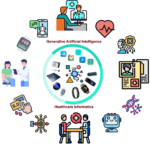 The intersection of Generative AI and healthcare has garnered significant attention due to its immense potential to transform medical research, diagnosis, treatment, and patient care. Generative AI models enable disease likelihood prediction, early condition detection, precise diagnoses, and personalized treatment plans for improved patient care. Additionally, it facilitates drug development through simulated interactions and automates medical documentation to reduce administrative burdens. While the potential impacts are promising, ethical considerations, patient privacy, and regulatory approval for AI-centric approaches must be carefully addressed. This special issue facilitates cutting-edge research dissemination and fosters collaboration in this crucial area. It seeks to publish novel research in generative AI for healthcare, highlighting advancements in healthcare informatics.
The intersection of Generative AI and healthcare has garnered significant attention due to its immense potential to transform medical research, diagnosis, treatment, and patient care. Generative AI models enable disease likelihood prediction, early condition detection, precise diagnoses, and personalized treatment plans for improved patient care. Additionally, it facilitates drug development through simulated interactions and automates medical documentation to reduce administrative burdens. While the potential impacts are promising, ethical considerations, patient privacy, and regulatory approval for AI-centric approaches must be carefully addressed. This special issue facilitates cutting-edge research dissemination and fosters collaboration in this crucial area. It seeks to publish novel research in generative AI for healthcare, highlighting advancements in healthcare informatics.
Mobile Health (mHealth): Two Decades of Unprecedented Growth and Contributions to Global Health – 20th Anniversary Special Issue
Submission Deadline: 30 September 2024
This special is dedicated to two esteemed past Editors-in-Chief of the IEEE Transactions on Information Technology in Biomedicine (TITB), now IEEE J-BHI, the late Professors Swamy Laxminarayan, the Founding Editor of the Transactions, and Niilo Saranummi. Their unwavering dedication and visionary support laid the groundwork for the progress and development witnessed in this field. Commemorating their legacy within this issue acknowledges their efforts and the pivotal role they played in fostering the growth and evolution of mobile health and the journal.
The Health Technology application for Medical Internet-Things (MIoT)
Submission Deadline: 30 July 2024

Bio-inspired Optimization Algorithms for Personalized Healthcare Treatment Planning
Submission Deadline: 5 March 2024
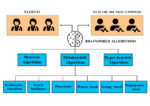
Ethical AI for Biomedical and Health Informatics in the Generative Era
Submission Deadline: 1 May 2024
The rapid advancements in artificial intelligence (AI) and machine learning techniques have revolutionized the field of biomedical and health informatics.  These developments, particularly in the generative AI domain, hold immense potential for accelerating discoveries, improving diagnostics, personalizing treatment plans, and enhancing patient care. However, along with these opportunities come ethical, legal, and societal challenges that must be addressed to ensure the responsible and ethical deployment of AI in healthcare. The “Ethical AI for Biomedical and Health Informatics in the Generative Era” aims to provide a comprehensive platform for researchers, practitioners, and policymakers to share their insights, methodologies, and case studies that explore the responsible development, deployment, and regulation of AI technologies in the biomedical and health informatics domain. This special issue welcomes original research articles, reviews, case studies, and opinion pieces that shed light on various aspects of responsible and ethical AI for biomedical and health informatics in the generative era.
These developments, particularly in the generative AI domain, hold immense potential for accelerating discoveries, improving diagnostics, personalizing treatment plans, and enhancing patient care. However, along with these opportunities come ethical, legal, and societal challenges that must be addressed to ensure the responsible and ethical deployment of AI in healthcare. The “Ethical AI for Biomedical and Health Informatics in the Generative Era” aims to provide a comprehensive platform for researchers, practitioners, and policymakers to share their insights, methodologies, and case studies that explore the responsible development, deployment, and regulation of AI technologies in the biomedical and health informatics domain. This special issue welcomes original research articles, reviews, case studies, and opinion pieces that shed light on various aspects of responsible and ethical AI for biomedical and health informatics in the generative era.
AI-Based Optimization of Body Area Networks for Medical Informatics Applications
Submission Deadline: 10 April 2024
The rapid advancement in Artificial Intelligence (AI) and Internet of Things (IoT) has paved way for innovative applications in medical informatics. Also, AI holds extreme potential in 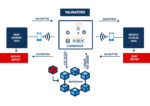 the optimization of Body Area Networks (BAN) for medical informatics applications. AI-based optimization in Body Area Networks for medical informatics applications presents a transformative paradigm shift in healthcare. AI-based optimization in BANs involves the development and deployment of AI algorithms to streamline data acquisition, processing, and decision-making processes. Nonetheless, several challenges are yet to be overcome. Data security and privacy are among the most significant issues. The sensitive nature of the data collected by BAN necessitates robust security measures to prevent breaches and ensure privacy. AI algorithms can both pose and solve these issues, with advancements in secure, privacy-preserving AI offering potential solutions. Furthermore, energy efficiency is another challenge, as wearable devices require longevity in power. AI-based power management systems can optimize energy consumption, thus extending the device’s life. Overall, AI-based optimization in BAN for medical informatics applications presents a transformative paradigm shift in healthcare. With continued research, collaboration, and innovation, AI-optimized BANs hold the potential to revolutionize healthcare and positively impact the lives of millions around the world. The aim of this Special Issue is to explore and highlight innovative research that combines AI and BAN in medical informatics.
the optimization of Body Area Networks (BAN) for medical informatics applications. AI-based optimization in Body Area Networks for medical informatics applications presents a transformative paradigm shift in healthcare. AI-based optimization in BANs involves the development and deployment of AI algorithms to streamline data acquisition, processing, and decision-making processes. Nonetheless, several challenges are yet to be overcome. Data security and privacy are among the most significant issues. The sensitive nature of the data collected by BAN necessitates robust security measures to prevent breaches and ensure privacy. AI algorithms can both pose and solve these issues, with advancements in secure, privacy-preserving AI offering potential solutions. Furthermore, energy efficiency is another challenge, as wearable devices require longevity in power. AI-based power management systems can optimize energy consumption, thus extending the device’s life. Overall, AI-based optimization in BAN for medical informatics applications presents a transformative paradigm shift in healthcare. With continued research, collaboration, and innovation, AI-optimized BANs hold the potential to revolutionize healthcare and positively impact the lives of millions around the world. The aim of this Special Issue is to explore and highlight innovative research that combines AI and BAN in medical informatics.
The Role of Medical Culture in Internet Intervention of Mobile Applications
Submission Deadline: 25 April 2024
In the contemporary digital era, it is commonly acknowledged that technology can be used to solve such medical conditions in order to advance the objectives of feasible development. One method for promoting awareness of environments like diabetes is through the growing use of mobile devices. People must first accept and use technology as their initial step in this direction. 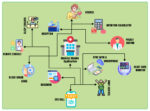 Yet, data indicates that individuals with poor macroeconomic factors use technology at modest frequencies. Based on the analysis, indulgence positively affects the adoption of mobile applications, while cultural characteristics like masculinity and femininity negatively affect it. The data also revealed that uncertainty avoidance had an impact on medical health application uptake, both positively and negatively. The existence of mobile devices and applications presented a huge opportunity to advance counselling services. Potential benefits of using behavioural health apps include, but are not limited to, increasing availability of subjective healthcare for people who reside in remote or rural areas, shorter patient satisfaction, increased medicinal flexibility regarding channels and circumstances under which rehabilitation could arise, and personal growth for users with cognitive medical conditions. Health is perhaps one of the most crucial challenges, necessitating creative infection prevention strategies. Mobile applications must take older users’ needs and preferences into consideration. We are seeking computer science approaches, strategies, tools, and real-issue analyses that could aid the medical community in operationalizing sustainable AI through Internet intervention and software devices.
Yet, data indicates that individuals with poor macroeconomic factors use technology at modest frequencies. Based on the analysis, indulgence positively affects the adoption of mobile applications, while cultural characteristics like masculinity and femininity negatively affect it. The data also revealed that uncertainty avoidance had an impact on medical health application uptake, both positively and negatively. The existence of mobile devices and applications presented a huge opportunity to advance counselling services. Potential benefits of using behavioural health apps include, but are not limited to, increasing availability of subjective healthcare for people who reside in remote or rural areas, shorter patient satisfaction, increased medicinal flexibility regarding channels and circumstances under which rehabilitation could arise, and personal growth for users with cognitive medical conditions. Health is perhaps one of the most crucial challenges, necessitating creative infection prevention strategies. Mobile applications must take older users’ needs and preferences into consideration. We are seeking computer science approaches, strategies, tools, and real-issue analyses that could aid the medical community in operationalizing sustainable AI through Internet intervention and software devices.
Data Acquisition and Analysis of Genomics and Informatics-Oriented Biomedicine
Submission Deadline: 25 March 2024
A medical subdiscipline characterized as computational biology, connected to genomics and genomics, uses digital techniques to gather, preserve, analyze, and share physiological information and data, such as genomic and polyamines sequencing, or interpretations about such sequencing. The genomics and the microbiome endeavor are demonstrations of epidemiology. 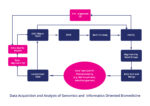 Using techniques and technology, epidemiology is mostly used to determine the degree of cognition from biomedical data. Big data applications in health coverage are a rapidly expanding topic, including numerous recent results and approaches reported in recent years. In particular, increased operations in genomics let researchers conduct novel genetic sequence correlation analyses of disorders. Commercial intelligence helps healthcare professionals use the enormous amounts of client records gathered to make wise judgments. This research addresses the obstacles, constraints, and potential for advancing big data healthcare applications, along with an overview of current developments and advancements in numerous medical fields. Big database properties necessitate the development of powerful, cutting-edge technology to obtain important information and create increasingly comprehensive care services. Additionally, cloud storage can enhance the system’s velocity, responsiveness, and versatility since it takes fewer expenditures for maintenance services, such as deployment, customization, and debugging. It minimizes the requirement for maintaining equipment or software capacity. Public clouds are the foundation of many modern big data applications. In light of the preceding, we invite scholars to submit original research articles and review papers for the current Special Issue that will address the Data gathering and analysis of genomics and informatics-oriented biomedicine.
Using techniques and technology, epidemiology is mostly used to determine the degree of cognition from biomedical data. Big data applications in health coverage are a rapidly expanding topic, including numerous recent results and approaches reported in recent years. In particular, increased operations in genomics let researchers conduct novel genetic sequence correlation analyses of disorders. Commercial intelligence helps healthcare professionals use the enormous amounts of client records gathered to make wise judgments. This research addresses the obstacles, constraints, and potential for advancing big data healthcare applications, along with an overview of current developments and advancements in numerous medical fields. Big database properties necessitate the development of powerful, cutting-edge technology to obtain important information and create increasingly comprehensive care services. Additionally, cloud storage can enhance the system’s velocity, responsiveness, and versatility since it takes fewer expenditures for maintenance services, such as deployment, customization, and debugging. It minimizes the requirement for maintaining equipment or software capacity. Public clouds are the foundation of many modern big data applications. In light of the preceding, we invite scholars to submit original research articles and review papers for the current Special Issue that will address the Data gathering and analysis of genomics and informatics-oriented biomedicine.
Current Trends and Future Directions in Biomedical Data Science
Submission Deadline: 17 June 2024
Dedicated to Professor Panos M. Pardalos on his 70th birthday, this special issue celebrates his contributions to the field and offers a platform for researchers to  share their latest findings, ideas, and future directions in biomedical data science. Data science has rapidly developed over the past decade, with numerous advancements and innovations in machine learning, big data analytics, and artificial intelligence. These developments have significantly impacted various domains, including healthcare systems and biomedical research. Integrating data science techniques into healthcare and biomedical research can revolutionize how we diagnose, treat, and prevent diseases, leading to more personalized and effective treatments. However, biomedical data acquisition, processing, storage, and analysis pose significant challenges. Biomedical data, such as medical images, genomic data, and electronic health records, are often extensive in size and complex in nature, making it challenging to extract meaningful insights. Furthermore, the increasing volume and variety of biomedical data require advanced techniques and tools for efficient processing and analysis. To address these challenges, researchers and practitioners in biomedical data science are constantly exploring new methods and approaches to analyze and interpret biomedical data. The aim is to develop innovative solutions that can improve disease diagnosis, treatment, and prevention accuracy and efficiency.
share their latest findings, ideas, and future directions in biomedical data science. Data science has rapidly developed over the past decade, with numerous advancements and innovations in machine learning, big data analytics, and artificial intelligence. These developments have significantly impacted various domains, including healthcare systems and biomedical research. Integrating data science techniques into healthcare and biomedical research can revolutionize how we diagnose, treat, and prevent diseases, leading to more personalized and effective treatments. However, biomedical data acquisition, processing, storage, and analysis pose significant challenges. Biomedical data, such as medical images, genomic data, and electronic health records, are often extensive in size and complex in nature, making it challenging to extract meaningful insights. Furthermore, the increasing volume and variety of biomedical data require advanced techniques and tools for efficient processing and analysis. To address these challenges, researchers and practitioners in biomedical data science are constantly exploring new methods and approaches to analyze and interpret biomedical data. The aim is to develop innovative solutions that can improve disease diagnosis, treatment, and prevention accuracy and efficiency.
Advancing Personalized Healthcare: Integrating AI and Health Informatics
Submission Deadline: 15 April 2024
This special issue aims to explore the transformative potential of Artificial Intelligence and  health informatics in the realm of personalized healthcare. Rapid advancements in AI, data analytics, and technology have paved the way for innovative approaches to individualized patient care. The special issue aims to foster interdisciplinary collaboration between AI experts, computer scientists, healthcare professionals, and informatics specialists. By showcasing cutting-edge research and practical applications, the special issue will contribute to advancing personalized healthcare approaches, promoting patient-centric care, and enhancing the journal’s reputation in the evolving field of health and medical informatics.
health informatics in the realm of personalized healthcare. Rapid advancements in AI, data analytics, and technology have paved the way for innovative approaches to individualized patient care. The special issue aims to foster interdisciplinary collaboration between AI experts, computer scientists, healthcare professionals, and informatics specialists. By showcasing cutting-edge research and practical applications, the special issue will contribute to advancing personalized healthcare approaches, promoting patient-centric care, and enhancing the journal’s reputation in the evolving field of health and medical informatics.
Radar-based Physiological Measurement Techniques for Healthcare and Health Monitoring
Submission Deadline: 1 July 2024
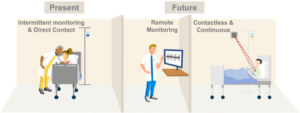 In recent years, radar technology for health monitoring has been a subject of concerted research in a broad range of application domains. This includes vital signs extraction, physiological pattern recognition, sportsperson performance analysis, human gait analysis, head motion and eye tracking, human vocal sound detection, gesture recognition, sign language recognition, emotion/cognition recognition, and psychological assessment (e.g., stress and depression). Unlike wearable sensors, a radar-based device measures physiological signals without mechanical contact with the human skin. Contrary to optical/vision sensors, radar signals can penetrate clothing and do not raise privacy concerns. Overall, radar-based health monitoring meets the requirements of a non-disturbing, ubiquitous-use, all-weather, penetrable, privacy-preserving sensing. This has led to emergence of a rich set of useful and interesting healthcare applications ranging from clinical to home care, sports training to automotive autonomy and safety. Lately, there has been a focus on radar-based sensing for more complex applications such as patient/neonatal monitoring in intensive care units, general wards, emergency department triage, MR/CT cardiac and respiratory gating. Radar practitioners are also striving to achieve accurate and robust biometrics in complex challenging environments such as crowded spaces, dynamic body motions, through-wall sensing, and drone-borne radars. This requires exploiting techniques such as sensor fusion, complex array deployments, multiple wavelengths, and advanced signal processing algorithms. This special issue intends to bring together cutting-edge research on radar-aided health monitoring.
In recent years, radar technology for health monitoring has been a subject of concerted research in a broad range of application domains. This includes vital signs extraction, physiological pattern recognition, sportsperson performance analysis, human gait analysis, head motion and eye tracking, human vocal sound detection, gesture recognition, sign language recognition, emotion/cognition recognition, and psychological assessment (e.g., stress and depression). Unlike wearable sensors, a radar-based device measures physiological signals without mechanical contact with the human skin. Contrary to optical/vision sensors, radar signals can penetrate clothing and do not raise privacy concerns. Overall, radar-based health monitoring meets the requirements of a non-disturbing, ubiquitous-use, all-weather, penetrable, privacy-preserving sensing. This has led to emergence of a rich set of useful and interesting healthcare applications ranging from clinical to home care, sports training to automotive autonomy and safety. Lately, there has been a focus on radar-based sensing for more complex applications such as patient/neonatal monitoring in intensive care units, general wards, emergency department triage, MR/CT cardiac and respiratory gating. Radar practitioners are also striving to achieve accurate and robust biometrics in complex challenging environments such as crowded spaces, dynamic body motions, through-wall sensing, and drone-borne radars. This requires exploiting techniques such as sensor fusion, complex array deployments, multiple wavelengths, and advanced signal processing algorithms. This special issue intends to bring together cutting-edge research on radar-aided health monitoring.
Orchestrating Biomedical Breakthroughs through the Fusion of NLP Techniques and GPT Transformers
Submission Deadline: 31 July 2024
The integration of natural language processing (NLP) techniques with GPT (Generative Pre-trained Transformer) models offers immense potential for biomedical applications. GPT models possess remarkable language generation and contextual comprehension abilities, which, when combined with NLP, can enhance a wide array of biomedical tasks. This integration facilitates tasks such as biomedical text generation, medical question-answering systems, and clinical decision support, benefiting both healthcare professionals and researchers. Nonetheless, challenges include the scarcity of high-quality biomedical data for model fine-tuning, the need for continuous model updates due to evolving medical knowledge, and ensuring model interpretability, transparency, and ethical considerations. This special issue seeks to address these challenges and welcomes contributions encompassing experimental, conceptual, and theoretical approaches to advance the field of biomedical applications.
Foundation Models in Medical Imaging
Submission Deadline: 15 July 2024
Foundation Models (FMs), such as Diffusion models, Transformer, BERT, DALL-E, GPT, etc., are based on deep neural networks and transfer learning, and are often referred as pre-trained or self-supervised models. Foundation models (FMs) have gained immense popularity in the field of medical imaging. They are often trained on large datasets to extract meaningful representations of multimodal data. They have revolutionized the way medical images are analyzed and led to improved diagnostic accuracy, reduced manual effort, and faster analysis times.  Compared to Convolutional Neural Networks (CNNs), FMs are pre-trained on large amounts of diverse data, allowing them to learn robust and general features that can be fine-tuned for specific tasks such as detecting anomalies, classifying diseases, segmenting lesions, etc. However, FMs in medical imaging face several challenges, including the limited availability of large annotated medical imaging datasets, the variability and complexity of medical imaging data, the weak interpretability of the models, and how to ensure their performance and safety in real-world applications. This special topic aims to address the challenges and opportunities associated with using foundation models for medical imaging and biomedical image analysis. By exploring innovative approaches and solutions, this research will contribute to the advancement of medical imaging techniques and the effective utilization of foundation models in the healthcare domain.
Compared to Convolutional Neural Networks (CNNs), FMs are pre-trained on large amounts of diverse data, allowing them to learn robust and general features that can be fine-tuned for specific tasks such as detecting anomalies, classifying diseases, segmenting lesions, etc. However, FMs in medical imaging face several challenges, including the limited availability of large annotated medical imaging datasets, the variability and complexity of medical imaging data, the weak interpretability of the models, and how to ensure their performance and safety in real-world applications. This special topic aims to address the challenges and opportunities associated with using foundation models for medical imaging and biomedical image analysis. By exploring innovative approaches and solutions, this research will contribute to the advancement of medical imaging techniques and the effective utilization of foundation models in the healthcare domain.
Foundation Models for the Next Generation of Biomedical and Healthcare Intelligence
Submission Deadline: 1 April 2024
Foundation models, or large AI models, are models recently emerging with massive scales in both parameter-wise and data-wise, 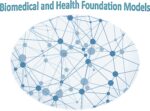 the magnitudes of which can reach beyond billions. Once pretrained, large AI models demonstrate impressive performance in various downstream tasks, showing generalist intelligence. A prime example is the ChatGPT, whose capability has compelled people’s imagination about the far-reaching influence that large AI models can have and their potential to transform different domains of our lives. The past few months have witnessed a surge in the interest of developing foundation models, e.g., various large language models (LLMs), and segment anything model (SAM). In health informatics, the advent of foundation models has brought new paradigms in the design of methodologies and the practices of data collection. With the ubiquity of medical internet of things (such as pervasive wearable sensors), the massive medical and clinical history (such as electronic health records (EHRs)), the prevalent medical imaging for diagnosis (such as computed-tomography (CT) scans), the growing discovery of genomic sequences, and more, the abundance of multi-modal biomedical, clinical, and health data provides the opportunities to develop, validate, and advance foundation models for breakthroughs in health-related areas, fostering the next generation of biomedical and health intelligence.
the magnitudes of which can reach beyond billions. Once pretrained, large AI models demonstrate impressive performance in various downstream tasks, showing generalist intelligence. A prime example is the ChatGPT, whose capability has compelled people’s imagination about the far-reaching influence that large AI models can have and their potential to transform different domains of our lives. The past few months have witnessed a surge in the interest of developing foundation models, e.g., various large language models (LLMs), and segment anything model (SAM). In health informatics, the advent of foundation models has brought new paradigms in the design of methodologies and the practices of data collection. With the ubiquity of medical internet of things (such as pervasive wearable sensors), the massive medical and clinical history (such as electronic health records (EHRs)), the prevalent medical imaging for diagnosis (such as computed-tomography (CT) scans), the growing discovery of genomic sequences, and more, the abundance of multi-modal biomedical, clinical, and health data provides the opportunities to develop, validate, and advance foundation models for breakthroughs in health-related areas, fostering the next generation of biomedical and health intelligence.
Real-time Healthcare Monitoring with IoT Networks
Submission Deadline: 31 July 2023
Recently, the real-time healthcare monitoring of patients has been of great significance in the healthcare industry, directly impacting the 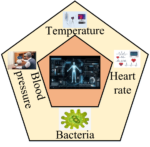 effectiveness and timeliness of the corresponding treatment. However, healthcare monitoring devices are usually equipped with heterogeneous communication protocols due to different communication requirements, such as range, bandwidth, and power consumption. Therefore, real-time healthcare monitoring is generally challenging in IoT networks for the following reasons. Firstly, the deployment complexity and additional hardware cost that result from the multi-radio gateway are high for signal conversion. Secondly, the interference caused by incoming and outgoing traffic is serious, especially in multi-hop settings. At this time, as a promising enabler to bridge the devices with different communication protocols, Cross Technology Communication (CTC) technique can bridge the direct communication with IoT networks. Hence, it is urgent to realize real-time healthcare monitoring in IoT networks with CTC.
effectiveness and timeliness of the corresponding treatment. However, healthcare monitoring devices are usually equipped with heterogeneous communication protocols due to different communication requirements, such as range, bandwidth, and power consumption. Therefore, real-time healthcare monitoring is generally challenging in IoT networks for the following reasons. Firstly, the deployment complexity and additional hardware cost that result from the multi-radio gateway are high for signal conversion. Secondly, the interference caused by incoming and outgoing traffic is serious, especially in multi-hop settings. At this time, as a promising enabler to bridge the devices with different communication protocols, Cross Technology Communication (CTC) technique can bridge the direct communication with IoT networks. Hence, it is urgent to realize real-time healthcare monitoring in IoT networks with CTC.
Healthcare Information Systems for Disease Monitoring and Management in Smart Cities
Submission Deadline: 29 February 2024
Healthcare Information Systems play a vital role in disease monitoring and management within the context of smart cities.  These advanced systems leverage technology and data to facilitate efficient and effective healthcare delivery. By integrating various components such as electronic health records (EPR), telemedicine, wearable health monitors, and medical data analytics, healthcare providers can acquire real-time information on disease patterns and population health. Smart cities, equipped with sensors and interconnected infrastructure, enable the seamless collection and analysis of health-related data, facilitating early detection and proactive management of diseases. Through these information systems, healthcare professionals can access comprehensive patient data, track health trends, and implement targeted interventions. Furthermore, residents benefit from improved access to healthcare services, personalized health monitoring, and timely alerts regarding disease outbreaks. Healthcare Information Systems contribute significantly to disease monitoring and management, enhancing public health outcomes within the smart city infrastructure.
These advanced systems leverage technology and data to facilitate efficient and effective healthcare delivery. By integrating various components such as electronic health records (EPR), telemedicine, wearable health monitors, and medical data analytics, healthcare providers can acquire real-time information on disease patterns and population health. Smart cities, equipped with sensors and interconnected infrastructure, enable the seamless collection and analysis of health-related data, facilitating early detection and proactive management of diseases. Through these information systems, healthcare professionals can access comprehensive patient data, track health trends, and implement targeted interventions. Furthermore, residents benefit from improved access to healthcare services, personalized health monitoring, and timely alerts regarding disease outbreaks. Healthcare Information Systems contribute significantly to disease monitoring and management, enhancing public health outcomes within the smart city infrastructure.
Pervasive Informatics for Healthcare
Submission Deadline: 1 June 2024
Trustworthy Machine Learning for Health Informatics
Submission Deadline: 1 November 2023
The past decade has witnessed a remarkable growth of machine learning (ML) research in health informatics. Studies have reported that ML has achieved 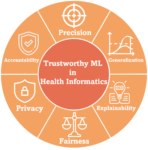 expert-comparable or even expert-surpassed performance for various healthcare tasks, which holds the promise of becoming widely applicable in clinical practice. Despite achieving high accuracy, the landing of current ML technology in the healthcare field is essentially challenged by its trustworthiness. Through this special issue, we want to draw attention to improving the credibility of ML for healthcare informatics in the aspects of explainability, generalization, fairness, privacy-preserving ability, accountability, etc., to enhance the trust and confidence of doctors and patients in adopting the related techniques.
expert-comparable or even expert-surpassed performance for various healthcare tasks, which holds the promise of becoming widely applicable in clinical practice. Despite achieving high accuracy, the landing of current ML technology in the healthcare field is essentially challenged by its trustworthiness. Through this special issue, we want to draw attention to improving the credibility of ML for healthcare informatics in the aspects of explainability, generalization, fairness, privacy-preserving ability, accountability, etc., to enhance the trust and confidence of doctors and patients in adopting the related techniques.
Improving the trustworthiness of ML in healthcare requires bringing joint efforts from multiple fields such as machine learning, clinical research, and medical imaging to provide insights from different perspectives of algorithm design, data acquisition and annotation, clinical findings, and benchmark establishment. Therefore, this special issue will provide a timely collection of up-to-date research to benefit researchers and practitioners working in trustworthy machine learning for healthcare informatics.
The recent advances in social network analysis for Personality Development
Submission Deadline: 16 August 2023
Recent advances in social network analysis have led to discovering a set of similar human behaviors that work similarly to human emotions. This feature allows researchers to develop a personality based on creativity, social, emotional, and analogous human behavior. From an evolutionary point of view, similar human behavior has been evolved by natural selection over millions of years. 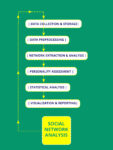 And are emerging in humans as creative expression (musical, artistic), social interaction (cooperation, negotiation), emotional expression (feelings and sentiments), and similar human behavior (including sports, hobbies, and ways to unwind). These four essential elements form a variety of cognitive processes in terms of a rich mental life. Creative human behavior analogous which cause flow experiences can be used for well-being and happiness. Social human equivalent human behavior which causes trust can be used for friendship and healthy family relationships. Emotional human behavior analogous which cause joy can be used for positive happiness in case of humor or novel situation. Human analogous which cause pain, can be used for perseverance and persistence as applied to creative pursuits such as learning new skills. The application of social network analysis to personality development is an important step forward in understanding human behavior. Hence, more advanced research in this domain has become essential.
And are emerging in humans as creative expression (musical, artistic), social interaction (cooperation, negotiation), emotional expression (feelings and sentiments), and similar human behavior (including sports, hobbies, and ways to unwind). These four essential elements form a variety of cognitive processes in terms of a rich mental life. Creative human behavior analogous which cause flow experiences can be used for well-being and happiness. Social human equivalent human behavior which causes trust can be used for friendship and healthy family relationships. Emotional human behavior analogous which cause joy can be used for positive happiness in case of humor or novel situation. Human analogous which cause pain, can be used for perseverance and persistence as applied to creative pursuits such as learning new skills. The application of social network analysis to personality development is an important step forward in understanding human behavior. Hence, more advanced research in this domain has become essential.
This special issue aims at collecting, reviewing, and analyzing recent advances of different methods for analyzing relationships, structural properties, communication, and interactions in social networks. The aim is to enhance our understanding of how these methods can help us explore personality development from a social network perspective.
Medical robotics vision through deep learning techniques
Submission Deadline: 15 June 2023
The Image Recognition Toolkit is a deep neural network-generating Machine Learning program. It uses an object recognition camera system to interpret and analyze trends in entities, users, places, and movements in photos on exact pixels. The image recognition version brings tangible 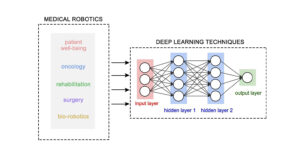 importance by using the deep neural network technology algorithm towards the educational world by allowing younger learners to capture content more conveniently. For example, print options are available in image recognition programs, which fall under the deep neural network category and are based on machine learning. One such tremendously supports physically disabled or autistic pupils in reading the information. Supervised learning exploits deep neural networks to extract valuable image features from data. A pre-trained deep neural network, for instance, may be used to extract artifacts such as roughness from photographic images by employing image recognition. A visual representation of Deep neural networks is reshaping image recognition approaches. Deep neural networks perform a variety of functions, including image identification. Pattern recognition is the goal of deep neural networks, which are computational models that identify trends.
importance by using the deep neural network technology algorithm towards the educational world by allowing younger learners to capture content more conveniently. For example, print options are available in image recognition programs, which fall under the deep neural network category and are based on machine learning. One such tremendously supports physically disabled or autistic pupils in reading the information. Supervised learning exploits deep neural networks to extract valuable image features from data. A pre-trained deep neural network, for instance, may be used to extract artifacts such as roughness from photographic images by employing image recognition. A visual representation of Deep neural networks is reshaping image recognition approaches. Deep neural networks perform a variety of functions, including image identification. Pattern recognition is the goal of deep neural networks, which are computational models that identify trends.
Multi-modal joint learning in healthcare imaging
Submission Deadline: 15 February 2024
With the swift advancement of medical imaging hardware and other medical apparatus, the healthcare domain has transitioned into an era of multimodal information. 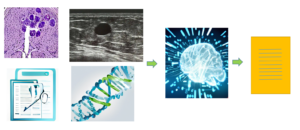 Vast amounts of multimodal data, comprising images such as X-ray, CT, and distinct sequences of MRI, as well as medical reports, are daily uploaded to the PACS or patient electronic system. It is imperative to exploit information from different resources to help artificial intelligence systems better comprehend healthcare issues, as it is an established fact that exploiting information from multimodal sources leads to more effective diagnosis and treatment planning. The purpose of multimodal joint learning is to build models that can process and establish correlation between information from varied modalities, by exploiting the strengths of diverse modalities such as images, medical reports, pathological tests, waveform data, wearable data, genetics data, etc.
Vast amounts of multimodal data, comprising images such as X-ray, CT, and distinct sequences of MRI, as well as medical reports, are daily uploaded to the PACS or patient electronic system. It is imperative to exploit information from different resources to help artificial intelligence systems better comprehend healthcare issues, as it is an established fact that exploiting information from multimodal sources leads to more effective diagnosis and treatment planning. The purpose of multimodal joint learning is to build models that can process and establish correlation between information from varied modalities, by exploiting the strengths of diverse modalities such as images, medical reports, pathological tests, waveform data, wearable data, genetics data, etc.
Enabling Healthcare AI and Informatics by Energy-Efficient Network Design and Protocols for 5G
Submission Deadline: 30 October 2023
The most critical design aspect of 5G is network slicing, a kind of virtual networking infrastructure that enables tailored connectivity and data processing in terms of data speed, quality, network configuration, and latency according to the specific use cases. It reduces the capital expenses while increasing the operational efficiency and time of the 5G network. Besides that, modern networks are rapidly changing towards software-based automation through Network Function Virtualization (NFV) and Software-defined control for better infrastructure scaling and lower computational redundancy, likely reducing energy consumption. However, there are some significant challenges in 5G assisted healthcare services, such as lack of inte roperability, standardization, device complexity, and security. As more IoT devices are run on the network, security remains critical in 5G enabled devices particularly, due to network bandwidth and unprotected IoT devices. This special issue focuses on innovative ways of designing novel network architecture with more emphasis on energy-efficient approaches for optimal performance of 5G-assisted healthcare applications.
roperability, standardization, device complexity, and security. As more IoT devices are run on the network, security remains critical in 5G enabled devices particularly, due to network bandwidth and unprotected IoT devices. This special issue focuses on innovative ways of designing novel network architecture with more emphasis on energy-efficient approaches for optimal performance of 5G-assisted healthcare applications.
New Age of Deep Learning on Drug Discovery: Research to Practice
Submission Deadline: 5 July 2023
Artificial intelligence is a branch of computer science that attempts to simulate human intelligence in a machine. AI systems are powered by algorithms, using techniques such as machine learning and deep learning to demonstrate “intelligent” behavior. Deep learning is a subset of machine learning that has shown 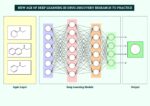 significant superior performance than some existing traditional machine learning approaches. Deep Learning ensures pharmaceutical discovery, comprising progressive image study, the prognosis of molecular form and process, and automatic creation of creative chemical substance commodities with custom effects. Drug Discovery is a very time-consuming and expensive task, and Deep Learning can make this process faster and cheaper. Deep Learning enormously expedites the Drug Discovery approach and provides global measures to prevent the dissemination of transmissible diseases. AI incorporated with Deep Learning furnishes more additional effects on drug discovery. Deep Learning accesses a future in this area to create new drug innovations to control, handle, alleviate or heal diseases. More progressive technology guides the immediate vision and develops quicker. It is even a complicated method, expensive, and takes a lot of time.
significant superior performance than some existing traditional machine learning approaches. Deep Learning ensures pharmaceutical discovery, comprising progressive image study, the prognosis of molecular form and process, and automatic creation of creative chemical substance commodities with custom effects. Drug Discovery is a very time-consuming and expensive task, and Deep Learning can make this process faster and cheaper. Deep Learning enormously expedites the Drug Discovery approach and provides global measures to prevent the dissemination of transmissible diseases. AI incorporated with Deep Learning furnishes more additional effects on drug discovery. Deep Learning accesses a future in this area to create new drug innovations to control, handle, alleviate or heal diseases. More progressive technology guides the immediate vision and develops quicker. It is even a complicated method, expensive, and takes a lot of time.
Application of computational techniques in drug discovery and disease treatment
Submission Deadline: 30 September 2023

Computational techniques have been successfully applied in the field of drug discovery and disease treatment. Specially, computer-aided drug design, computational drug repositioning, drug-target interactions prediction and synergistic drug combinations prediction based on heterogeneous biological data have become critical topics in the search of drugs and therapeutic targets for various diseases. The study of these topics is not only to provide better understandings of the mechanisms of disease progression and drug therapy, but is also critical to the development of new drugs and the improvement of treatments. Recently, the applicability of computational techniques has been extended and broadly applied to nearly every stage in the drug discovery and development workflow.
Real world data processing in real time for smart healthcare
Submission Deadline: 31 December 2023
The rapidly increasing population demands innovative and advanced healthcare devices with advanced technological trends. 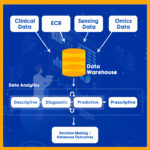 Smart healthcare is rapidly transforming from the traditional clinical-fanatical system to a distributed patient, intense form. The streamlined medical and sensor data are gaining more attention across the medical sectors, physicians, and smart hospitals for their remarkable features. The adoption of data from wireless sensors in healthcare applications is widely used for monitoring, diagnosis, screening, and executing better treatment procedures. Researchers encountered that those eminent sensor data applications are expected to improvise clinical services in clinics. The intervention of medical data starts up with the patient’s Electronic Health Record (HER) to collect data on wellness and fitness to monitor an individual’s health status. The numerous technological trends like IoT (Internet of Things), AI (Artificial Intelligence), and ML (Machine Learning) emerge as an effective solution to support medical data, which helps clinicians provide greater chances for easy recovery from physical and mental illness.
Smart healthcare is rapidly transforming from the traditional clinical-fanatical system to a distributed patient, intense form. The streamlined medical and sensor data are gaining more attention across the medical sectors, physicians, and smart hospitals for their remarkable features. The adoption of data from wireless sensors in healthcare applications is widely used for monitoring, diagnosis, screening, and executing better treatment procedures. Researchers encountered that those eminent sensor data applications are expected to improvise clinical services in clinics. The intervention of medical data starts up with the patient’s Electronic Health Record (HER) to collect data on wellness and fitness to monitor an individual’s health status. The numerous technological trends like IoT (Internet of Things), AI (Artificial Intelligence), and ML (Machine Learning) emerge as an effective solution to support medical data, which helps clinicians provide greater chances for easy recovery from physical and mental illness.
Machine Learning Technologies for Biomedical Signal Processing
Submission Deadline: 30 September 2023
Biomedical signal processing integrates the evaluation of health measures for the purpose of delivering significant factor diagnostic information. 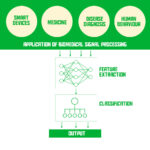 Real-time monitoring features enabled by biomedical signal processing can lead to better chronic condition control and timely identification of hazardous occurrences. Machine learning applications in healthcare, biomedicine and medical technology are gaining popularity these days. Recent improvements in machine learning (ML) and biomedical signal processing (BSP) have streamlined the development of a wide range of analyses of signals and computational domains, such as fingerprint recognition and healthcare information computation. Machine learning methods aid in the development of requisition and information-based biomedical signal assessment and computational platforms, which also contribute to the innovation of intelligent approaches.
Real-time monitoring features enabled by biomedical signal processing can lead to better chronic condition control and timely identification of hazardous occurrences. Machine learning applications in healthcare, biomedicine and medical technology are gaining popularity these days. Recent improvements in machine learning (ML) and biomedical signal processing (BSP) have streamlined the development of a wide range of analyses of signals and computational domains, such as fingerprint recognition and healthcare information computation. Machine learning methods aid in the development of requisition and information-based biomedical signal assessment and computational platforms, which also contribute to the innovation of intelligent approaches.
Medical robotics vision through deep learning techniques
Submission Deadline: 30 June 2023
The Image Recognition Toolkit is a deep neural network-generating Machine Learning program. It uses an object recognition camera system to interpret and analyze trends in entities, users, places, and movements in photos on exact pixels. The image recognition version brings tangible importance by using the deep neural network technology algorithm towards the educational world by allowing younger learners to capture content more conveniently. For example, print options are available in image recognition programs,  which fall under the deep neural network category and are based on machine learning. One such tremendously supports physically disabled or autistic pupils in reading the information. Supervised learning exploits deep neural networks to extract valuable image features from data. A pre-trained deep neural network, for instance, may be used to extract artifacts such as roughness from photographic images by employing image recognition. A visual representation of Deep neural networks is reshaping image recognition approaches. Deep neural networks perform a variety of functions, including image identification. Pattern recognition is the goal of deep neural networks, which are computational models that identify trends.
which fall under the deep neural network category and are based on machine learning. One such tremendously supports physically disabled or autistic pupils in reading the information. Supervised learning exploits deep neural networks to extract valuable image features from data. A pre-trained deep neural network, for instance, may be used to extract artifacts such as roughness from photographic images by employing image recognition. A visual representation of Deep neural networks is reshaping image recognition approaches. Deep neural networks perform a variety of functions, including image identification. Pattern recognition is the goal of deep neural networks, which are computational models that identify trends.
Swarm and Evolutionary Computing Driven Immuno- informatics for Biomedicine and Healthcare
Submission Deadline: 30 June 2023
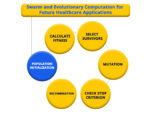
The impact of pollution and environmental degradation requires immediate action to enhance healthcare applications. Numerous technological innovations are being widely implemented to empower healthcare applications considerably. Swarm and Evolutionary Computation (SEC) is one of the emerging fields of modern computer sciences that deals with a nature-influenced system for optimizing real-world healthcare applications. Evolutionary computation is not just about problem-solving but also about developing technological trends that can make our lives better.
Applications of Intelligent Environments to Health
Submission Deadline: 15 July 2024
In these last years, influenced by different factors (including the pandemic and the social isolation associated), health issues (both mental and physical) have been impacted negatively in all societies worldwide. The capacity of health services has been compromised, with many cases having to be treated at home. 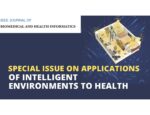 Both health infrastructure and personnel (doctors, nurses, support, etc.) has not been sufficient to adequately meet the existing demand. With this, it has been seen that it is necessary to promote and reinforce technological solutions that allow assisting and supporting the work of health personnel in activities such as monitoring, detection of risk situations, prevention and prediction, both in-situ and in tele-health scenarios. To advance in this direction, the main objective of this follow-up special issue related to the 19th International Conference on Intelligent Environments (IE’23) is to promote the development of solutions and methodologies associated with intelligent environments in the area of smart health and wellness in a broad sense.
Both health infrastructure and personnel (doctors, nurses, support, etc.) has not been sufficient to adequately meet the existing demand. With this, it has been seen that it is necessary to promote and reinforce technological solutions that allow assisting and supporting the work of health personnel in activities such as monitoring, detection of risk situations, prevention and prediction, both in-situ and in tele-health scenarios. To advance in this direction, the main objective of this follow-up special issue related to the 19th International Conference on Intelligent Environments (IE’23) is to promote the development of solutions and methodologies associated with intelligent environments in the area of smart health and wellness in a broad sense.
AI driven Internet of Medical Things for Smart Healthcare Applications: Challenges, and Future Trends
Submission Deadline: 20 August 2023
An Internet of Medical Things (IoMT) based smart healthcare system is a collection of several smart medical equipments including wearable devices and apps connected within the network to provide health information. In IoMT based smart healthcare systems, sensors and medical devices securely transmit medical data to the server nodes without human intervention. 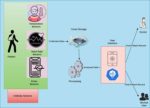 Some of the major components of smart healthcare systems are IoMT, medical sensors, artificial intelligence (AI), 5G, big data, edge computing, and cloud computing. The AI-driven internet of medical things healthcare system is a combination of IoT (used for periodic control) and AI (used for data analysis). This combination makes the healthcare system more intelligent over time. The main objective of this special issue is to bring together researchers to submit their innovative research outcomes related to the challenges, applications, architecture development, technologies, and future prospects of AI-driven IoMT for smart healthcare applications.
Some of the major components of smart healthcare systems are IoMT, medical sensors, artificial intelligence (AI), 5G, big data, edge computing, and cloud computing. The AI-driven internet of medical things healthcare system is a combination of IoT (used for periodic control) and AI (used for data analysis). This combination makes the healthcare system more intelligent over time. The main objective of this special issue is to bring together researchers to submit their innovative research outcomes related to the challenges, applications, architecture development, technologies, and future prospects of AI-driven IoMT for smart healthcare applications.
Deep Learning in Intrusion Detection of Cyberattacks for E-Health Applications
Submission Deadline: 25 September 2023
The e-health industry continues to grow and there are no signs that it is slowing down. As such, the industry’s projected revenue of $3.5 billion by 2022 remains right on track. 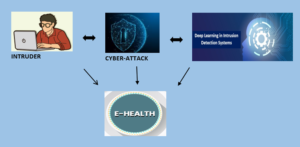 Thus, indicating that every major healthcare network will eventually offer some type of telehealth service to its patients. While e-health offers numerous benefits, it is vulnerable to cyber threats like any other information technology service. Deep learning is one of the exciting techniques which recently been vastly employed by the IDS or intrusion detection systems to increase their performance in securing the computer networks and hosts. An Intrusion Detection System (IDS) is a system that monitors network traffic for suspicious activity and issues an alert when such activity is discovered. Hackers exploit vulnerabilities in endpoint security to steal data. Implementing cybersecurity tools is the first step in securing patient data and the second step is reviewing security programs. E-health providers need to review their third-party provider contracts and discuss the strategies for responding to any intelligence threat that may arise. In addition, ask how to identify malicious emails and suspicious links so as to avoid cybersecurity threats. Another vital aspect of securing telehealth data includes remaining abreast of any current cybersecurity threats. Finding out up-to-date information related to e-health and cybersecurity.
Thus, indicating that every major healthcare network will eventually offer some type of telehealth service to its patients. While e-health offers numerous benefits, it is vulnerable to cyber threats like any other information technology service. Deep learning is one of the exciting techniques which recently been vastly employed by the IDS or intrusion detection systems to increase their performance in securing the computer networks and hosts. An Intrusion Detection System (IDS) is a system that monitors network traffic for suspicious activity and issues an alert when such activity is discovered. Hackers exploit vulnerabilities in endpoint security to steal data. Implementing cybersecurity tools is the first step in securing patient data and the second step is reviewing security programs. E-health providers need to review their third-party provider contracts and discuss the strategies for responding to any intelligence threat that may arise. In addition, ask how to identify malicious emails and suspicious links so as to avoid cybersecurity threats. Another vital aspect of securing telehealth data includes remaining abreast of any current cybersecurity threats. Finding out up-to-date information related to e-health and cybersecurity.
Role of Embedded Systems in Emerging Biomedical Applications
Submission Deadline: 31 March 2023
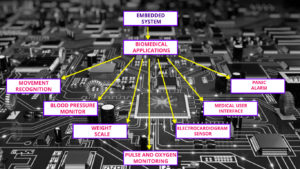 to merge the records to diagnose the problem to make accurate decisions for better treatment through advanced telecommunication technology. Mainly, embedded software and hardware technology are employed with biomedical applications like biomedical power units, movable diagnoses, clinical and biotechnical profilers, ambulatory monitoring, wireless nurse call system, and hospital queue management systems. Besides many reliable benefits in the use of the embedded system in biomedical applications, it also carries a few disadvantages such as backup failures, lack of technological improvement, strict maintenance, etc., which have to be considered. The special issue provides various opportunities to eradicate the challenges and imply different techniques for embedded systems in biomedical applications.
to merge the records to diagnose the problem to make accurate decisions for better treatment through advanced telecommunication technology. Mainly, embedded software and hardware technology are employed with biomedical applications like biomedical power units, movable diagnoses, clinical and biotechnical profilers, ambulatory monitoring, wireless nurse call system, and hospital queue management systems. Besides many reliable benefits in the use of the embedded system in biomedical applications, it also carries a few disadvantages such as backup failures, lack of technological improvement, strict maintenance, etc., which have to be considered. The special issue provides various opportunities to eradicate the challenges and imply different techniques for embedded systems in biomedical applications.
Submission Deadline: 30 April 2023
Infrastructure is urgently needed for AI in healthcare and, specifically, critical care. Existing critical care datasets and infrastructures lack 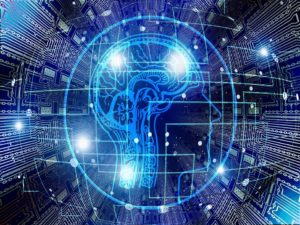 demographic, geographic, and biomedical diversity or the high-resolution waveform data critical to unlocking and optimizing phenotyping, prediction, and clinical decision making. This special issue addresses the ethical, legal, social, regulatory, biomedical, and teaming science challenges relevant for acquiring data at the requisite scale, developing models that balance precision and bias, and implementing artificial intelligence equitably in real-world clinical contexts. Special issue papers will detail approaches to ensure that methods for artificial intelligence in critical care are patient-focused, ensuring autonomy, privacy, accountability, clinical benefit, and equity, while promoting a new generation of clinicians and scientists equipped to responsibly leverage and integrate advances in AI.
demographic, geographic, and biomedical diversity or the high-resolution waveform data critical to unlocking and optimizing phenotyping, prediction, and clinical decision making. This special issue addresses the ethical, legal, social, regulatory, biomedical, and teaming science challenges relevant for acquiring data at the requisite scale, developing models that balance precision and bias, and implementing artificial intelligence equitably in real-world clinical contexts. Special issue papers will detail approaches to ensure that methods for artificial intelligence in critical care are patient-focused, ensuring autonomy, privacy, accountability, clinical benefit, and equity, while promoting a new generation of clinicians and scientists equipped to responsibly leverage and integrate advances in AI.
Intelligent nanorobots for a Smart and Sustainable Healthcare System
Submission Deadline: 30 June 2023
Data-driven Cognitive Computing for Smart Healthcare Systems
Submission Deadline: 15 September 2023
Recently, data-driven cognitive computing as a technology-based solution has attracted much attention from researchers and practitioners. The most significant 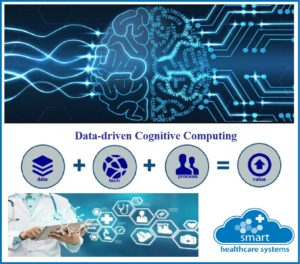 advantage of cognitive computing is its ability to “understand” unstructured data, including emotion, language, images, and video. Thus, it can be directed at improving efficiency in constructing smart healthcare systems. To this end, exploring advanced data-driven cognitive computing technologies have great potential and capacity to enable new methodology, applications, and dramatic improvements for achieving an elegant breakthrough in terms of seamless interoperability, low cost, high speed, low latency, and increased efficiency for smart healthcare construction.
advantage of cognitive computing is its ability to “understand” unstructured data, including emotion, language, images, and video. Thus, it can be directed at improving efficiency in constructing smart healthcare systems. To this end, exploring advanced data-driven cognitive computing technologies have great potential and capacity to enable new methodology, applications, and dramatic improvements for achieving an elegant breakthrough in terms of seamless interoperability, low cost, high speed, low latency, and increased efficiency for smart healthcare construction.
Recent Technologies in IoT for E-Health Applications
Submission Deadline: 25 October 2023
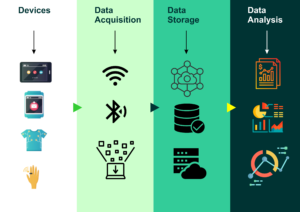
In recent decades, the Internet of Things (IoT) had its impacts and application in various sectors, and e-health is not an exception. Internet of things (IoT) has become a developing technology, which is acquiring commerciality among researchers and investigators. The necessity of implementing IoT advancements in e-health is that it provides more beneficiary features than conventional healthcare systems that fail to meet a growing population’s requirements. Implicating advances of IoT in e-health applications will potentially offer an incredible amount of drastic changes that typically meets the demand of the health care system in the future years. From the view of a contemporary modern health system, steps have been initiated to promote e-health services to the next level, but it is not sufficient. Researchers and practitioners are most welcomed to focus on emerging advances of IoT that could be applied to e-health applications to develop the health care system more effectively.
Metaverse for Healthcare: Trends, Challenges, and Solutions
Submission Deadline: 28 February 2023
Metaverse, just like the technology that carries people’s imagination in science fiction movies, is coming to us step by step. It brought people an immersive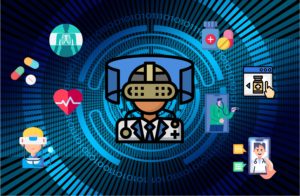 experience by combining virtual reality (VR) and augmented reality (AR) technologies to closely integrate the physical and cyber worlds. What are the application scenarios of metaverse in healthcare? Which ones are easy to land and implement, and which ones seem fantastical but are possible? Artificial intelligence has been widely used. How can AI technology be used to empower healthcare in the metaverse? In terms of hardware, there are also many directions worth studying, such as physical simulation devices and body-conditioning monitoring devices. In addition, security is an ongoing challenge in the digital world. In the metaverse world, how to ensure the security of user data is yet to be researched. How can blockchain technology, secure computing technology, and others enable privacy enhancement of metaverse healthcare? The related research is still in its initial stage, and later chapters are waiting to be written by us. Therefore, we call upon our colleagues from academia and industry to present their latest research results in metaverse in healthcare and to exchange and discuss future research directions and challenges.
experience by combining virtual reality (VR) and augmented reality (AR) technologies to closely integrate the physical and cyber worlds. What are the application scenarios of metaverse in healthcare? Which ones are easy to land and implement, and which ones seem fantastical but are possible? Artificial intelligence has been widely used. How can AI technology be used to empower healthcare in the metaverse? In terms of hardware, there are also many directions worth studying, such as physical simulation devices and body-conditioning monitoring devices. In addition, security is an ongoing challenge in the digital world. In the metaverse world, how to ensure the security of user data is yet to be researched. How can blockchain technology, secure computing technology, and others enable privacy enhancement of metaverse healthcare? The related research is still in its initial stage, and later chapters are waiting to be written by us. Therefore, we call upon our colleagues from academia and industry to present their latest research results in metaverse in healthcare and to exchange and discuss future research directions and challenges.
New Frontiers in Trusted Cyber-Physical Systems for Biomedical Applications
Submission Deadline: 15 August 2023
The special issue addresses the main running trends of cyber-physical system for biomedical applications. Wearable applications along with cyber systems  enhances the enroute for the emergence of growing medical applications worldwide. The trusted cyber physical system infuses the growing trends of synthetic biology and robotic systems along with cyber systems for the development of medical sectors.
enhances the enroute for the emergence of growing medical applications worldwide. The trusted cyber physical system infuses the growing trends of synthetic biology and robotic systems along with cyber systems for the development of medical sectors.
Submission Deadline: 30 January 2023
This special issue deals with the following topics of interest: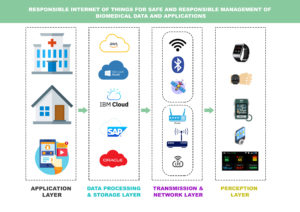
Integration of bio-sensors, devices, and controls with IoT for Biomedical applications
IoT enabled big data analytics for biomedical datasets and informatics
Edge computation for decentralized biomedical data understanding
Advancement Mobile Sensor Data for biomedical health informatics
Evolutionary computing enabled IoT for enhanced bioinformatics
IoT based Predictive analytics on biomedical enabled health informatics
Data-driven AI for Information Retrieval of biomedical Images
NLP enabled IoT for Semantic-based biomedical Image data mining
Health big data acquisition enabled IoT through advanced visualization analytics for Biomedical applications
IoT based Computer-aided diagnosis and detection for biomedical health informatics
Achieving Health Equity Through AI for Diagnosis and Treatment
Submission Deadline: 1 December 2022
 consciousness, just as it aims to replicate human beings’ perceptions through analytics based on data. AI helps produce digital apps through which the patient’s health record is maintained. It gives primary requirement data digitally whenever needed by the patient. Thus AI plays a vital role in achieving health equity through its application in diagnosing and treating patient diseases. To ensure that AI technologies are ethically integrated into the health system, It is necessary to agree on how to regulate algorithmic bias at the policy level. We invite researchers and practitioners to do more projects on AI applications in the Health sector.
consciousness, just as it aims to replicate human beings’ perceptions through analytics based on data. AI helps produce digital apps through which the patient’s health record is maintained. It gives primary requirement data digitally whenever needed by the patient. Thus AI plays a vital role in achieving health equity through its application in diagnosing and treating patient diseases. To ensure that AI technologies are ethically integrated into the health system, It is necessary to agree on how to regulate algorithmic bias at the policy level. We invite researchers and practitioners to do more projects on AI applications in the Health sector.Fuzzy Systems and Computational Methods for Brain Signals and Neuroimaging: Challenges and Future Trends
Submission Deadline: 31 December 2023
Insights of Machine Learning into Medical Decision Making Systems: From Research to Practice
Submission Deadline: 25 February 2023
Machine learning methods previously used to develop rational decisions are presently a demand for Emergency Machine learning. With rapidly expanding datasets, reliability also remains a vital 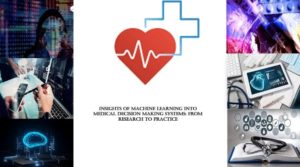 consideration when expanding and validating Machine learning models. Machine learning can also help healthcare institutions meet growing pharmaceutical demands, make or become better deals and lower costs. Machine learning modernisation at the bedside can help healthcare specialists discover and treat disease expertly and accompany more accuracy and personalised care. An observation of fashionable machine learning healthcare reveals how automation change can lead to active, comprehensive care strategies that improve patient results. While researchers in the field of Machine learning and machine intelligence order can be tested to comprehend subgroups of patients, guide scientific administration, and improve two together movement- and patient-centred results. This context features the benefits of these tools realised at various clinical sites and specify how the use of Medical learning, when faithfully built, grants permission to improve during the COVID-19 pandemic. Because of these changes, a predicting model accompanying good early performance concedes the possibility of decline by way of change in the middle from two points patients incapacitate for three weeks distinguished to inferior a week. Also, an individual’s patient portrait concedes the possibility of being in possession evolved entirely from a place where it’s admittance to those time points later all along hospitalisation. Discharges per period increased accompanying the pandemic’s peak and decreased accompanying lowered numbers of new cases.
consideration when expanding and validating Machine learning models. Machine learning can also help healthcare institutions meet growing pharmaceutical demands, make or become better deals and lower costs. Machine learning modernisation at the bedside can help healthcare specialists discover and treat disease expertly and accompany more accuracy and personalised care. An observation of fashionable machine learning healthcare reveals how automation change can lead to active, comprehensive care strategies that improve patient results. While researchers in the field of Machine learning and machine intelligence order can be tested to comprehend subgroups of patients, guide scientific administration, and improve two together movement- and patient-centred results. This context features the benefits of these tools realised at various clinical sites and specify how the use of Medical learning, when faithfully built, grants permission to improve during the COVID-19 pandemic. Because of these changes, a predicting model accompanying good early performance concedes the possibility of decline by way of change in the middle from two points patients incapacitate for three weeks distinguished to inferior a week. Also, an individual’s patient portrait concedes the possibility of being in possession evolved entirely from a place where it’s admittance to those time points later all along hospitalisation. Discharges per period increased accompanying the pandemic’s peak and decreased accompanying lowered numbers of new cases.
Submission Deadline: 31 March 2023
Within the computational biology and bioinformatics research communities, conventional analysis strategies lack the strong potential to analyze big data and to extract valuable knowledge from 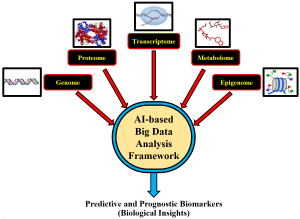 them, leading to incorrect practices. In the recent years, biological data analysis has experienced exponential growth by the application of advanced artificial intelligence (AI) technologies. This is mainly due the high ability and potentials of AI-based systems to develop algorithms and analytical models for interpreting biological information and thus to assist in making accurate predictions and/or decisions. The goal of this special issue is to provide researchers around the globe with cutting-edge research work for the best utilization of AI tools in computational biology and bioinformatics research. Attractive, recent, and innovative AI-based research work for emerging problems in the field of computational biology and relevant problems from the life sciences are invited. Full-length papers of original and unpublished research work as well as review manuscripts related to the Ai applications for the understanding, visualizing, and interpreting biomedical data for biology are welcomed.
them, leading to incorrect practices. In the recent years, biological data analysis has experienced exponential growth by the application of advanced artificial intelligence (AI) technologies. This is mainly due the high ability and potentials of AI-based systems to develop algorithms and analytical models for interpreting biological information and thus to assist in making accurate predictions and/or decisions. The goal of this special issue is to provide researchers around the globe with cutting-edge research work for the best utilization of AI tools in computational biology and bioinformatics research. Attractive, recent, and innovative AI-based research work for emerging problems in the field of computational biology and relevant problems from the life sciences are invited. Full-length papers of original and unpublished research work as well as review manuscripts related to the Ai applications for the understanding, visualizing, and interpreting biomedical data for biology are welcomed.
Cutting Edge innovations for Neuroimaging
Submission Deadline: 30 November 2022
The Neuroimaging system has been driving the CT market for clinical resources for years. Artificial Intelligence has been involved in cutting-edge technologies to get an accurate result despite all 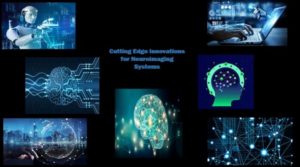 the frontiers in MedTech, there are also many other tools that help surgeons for identifying the issue in the applications of radiology. Cutting-edge is an extension of cloud computing in the data manipulation process. It takes special care on some particular segments called reliability, security and real-time prediction. Edge computing is a distributed architecture that is built on the basis of the cloud with the infrastructure of blockchain nodes to store and monitor the transactions provided. This tends to change based on the variability of the epidemic of time for different users. This Special Issue reviews that in these current technologies it is always recommended to train the neural network to get the accuracy in the cutting-edge technologies for More complex and efficient methods that can be always applied into these algorithms to gain the maximum accuracy in the field of neurology.
the frontiers in MedTech, there are also many other tools that help surgeons for identifying the issue in the applications of radiology. Cutting-edge is an extension of cloud computing in the data manipulation process. It takes special care on some particular segments called reliability, security and real-time prediction. Edge computing is a distributed architecture that is built on the basis of the cloud with the infrastructure of blockchain nodes to store and monitor the transactions provided. This tends to change based on the variability of the epidemic of time for different users. This Special Issue reviews that in these current technologies it is always recommended to train the neural network to get the accuracy in the cutting-edge technologies for More complex and efficient methods that can be always applied into these algorithms to gain the maximum accuracy in the field of neurology.
Artificial Intelligence and Internet of Medical Things (AI-IoMT)
Submission Deadline: 31 August 2023
Smart healthcare is a viewpoint in which ICT-assisted skills are communicated with handlers in all aspects, including society. Healthcare industry-leading scientific novelties offer peace of mind to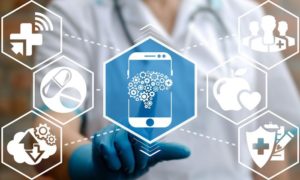 senior living residents, staff, and families. To sustain healthcare novelties, they should permit the three mainstays of sustainability that are social, financial, and environmental sustainability. Smart healthcare has been a field of implausible revolution and evolution in the newfangled era of smart societies. It is amongst the most significant constituents of smart cities and societies. More than 50 billion health-associated medical things are expected to be wired this year, and the Internet of Health Things (IoHT) standard will increase with 5G. The IoMT comprises a network associated with various kinds of health devices and sensors including but not limited to blood pressure, image digitizer, oxygen monitor devices, vital sign sensing devices, modems, display, storage devices, and networks of communication. Traditional IoMT comprises of devised used to aggregate data from the patients. However, still, the room is left to efficiently predict the future of the diseases using artificial intelligence (AI), e.g., early detection of COVID-19, pneumonia, arrhythmia classifications, etc. The advancement of IoMT using AI-based public medical care devices is a challenging task. Also, various challenging is available in planning and creating wise medical services devices; there is a prompt need to resolve this issue by proposing inventive public medical services systems and brilliant public medical care devices which can offer calculation and handling of clinical sensor information, move the expected undertakings at the edge level, and fulfill the current needs of savvy medical services arrangements.
senior living residents, staff, and families. To sustain healthcare novelties, they should permit the three mainstays of sustainability that are social, financial, and environmental sustainability. Smart healthcare has been a field of implausible revolution and evolution in the newfangled era of smart societies. It is amongst the most significant constituents of smart cities and societies. More than 50 billion health-associated medical things are expected to be wired this year, and the Internet of Health Things (IoHT) standard will increase with 5G. The IoMT comprises a network associated with various kinds of health devices and sensors including but not limited to blood pressure, image digitizer, oxygen monitor devices, vital sign sensing devices, modems, display, storage devices, and networks of communication. Traditional IoMT comprises of devised used to aggregate data from the patients. However, still, the room is left to efficiently predict the future of the diseases using artificial intelligence (AI), e.g., early detection of COVID-19, pneumonia, arrhythmia classifications, etc. The advancement of IoMT using AI-based public medical care devices is a challenging task. Also, various challenging is available in planning and creating wise medical services devices; there is a prompt need to resolve this issue by proposing inventive public medical services systems and brilliant public medical care devices which can offer calculation and handling of clinical sensor information, move the expected undertakings at the edge level, and fulfill the current needs of savvy medical services arrangements.
Construction of Metaverse of Medical Informatics
Submission Deadline: 1 February 2023
The core technologies of Metaverse, such as VR/AR and AI, have broad application prospects in the medical field. Picture Archiving and Communication System (PACS) medical imaging system is 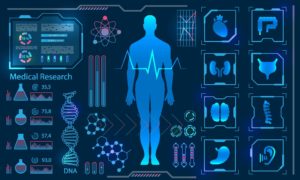 a bridge between data and technologies such as AI in the Metaverse. In terms of disease visualization, CT, DR, nuclear magnetic resonance and other imaging devices aim at disease visualization. Because organs are invisible inside the human body, the goal of the first generation of medical devices is to visualize invisible things. For example, the lung nodule positioning and three-dimensional visualization technology can take internal slice images one by one through medical devices. As a result, the “invisible” human organs can “show their original shape”, and even build a holographic digital human, providing a reference for surgical planning. The ultimate goal of Metaverse is to provide data basis for comprehensively improving human health by monitoring higher-level vital signs indicators such as human microorganism, nutrition and psychology, thus finding biological targets for health intervention.
a bridge between data and technologies such as AI in the Metaverse. In terms of disease visualization, CT, DR, nuclear magnetic resonance and other imaging devices aim at disease visualization. Because organs are invisible inside the human body, the goal of the first generation of medical devices is to visualize invisible things. For example, the lung nodule positioning and three-dimensional visualization technology can take internal slice images one by one through medical devices. As a result, the “invisible” human organs can “show their original shape”, and even build a holographic digital human, providing a reference for surgical planning. The ultimate goal of Metaverse is to provide data basis for comprehensively improving human health by monitoring higher-level vital signs indicators such as human microorganism, nutrition and psychology, thus finding biological targets for health intervention.
AI-empowered Internet of Things for Data-Driven Psychophysiological Computing
Submission Deadline: 31 May 2023
Psychophysiological computing focuses on the quantification, fusion, analysis and mining of multi-source physiological data (such as brain imaging, EEG, body electricity, heart rate, respiration,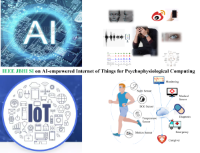 body temperature, etc.) to reversely derive the complex physiological-psychological mapping relationship and achieve a more comprehensive and objective quantitative perception and reasoning calculation of different mental states. One of the key enablers for Psychophysiological computing is the Internet of Things (IoT), which can exploit state-of-the-art communication technologies to support advanced services. Meanwhile, Artificial Intelligence (AI) has recently emerged as a powerful weapon that supports very implement efficient data analysis and make accurate decisions on service provisions in various kinds. Combining IoT with advanced AI technology can greatly benefit Psychophysiological computing.
body temperature, etc.) to reversely derive the complex physiological-psychological mapping relationship and achieve a more comprehensive and objective quantitative perception and reasoning calculation of different mental states. One of the key enablers for Psychophysiological computing is the Internet of Things (IoT), which can exploit state-of-the-art communication technologies to support advanced services. Meanwhile, Artificial Intelligence (AI) has recently emerged as a powerful weapon that supports very implement efficient data analysis and make accurate decisions on service provisions in various kinds. Combining IoT with advanced AI technology can greatly benefit Psychophysiological computing.
Generative Artificial Intelligence Driven Smart Healthcare
Submission Deadline: 31 August, 2023
Most of the AI-based healthcare applications are prediction techniques, which employ amounts of healthcare-related data for training and are then used for making smart diagnosis of a new 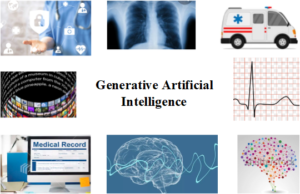 input. Such a pattern suffers from the in-sufficient data, the data imbalance, and the biases of the training samples. Large datasets that are diverse and representative are in high demand for improving the robustness. The generative AI (GenAI) paradigm is a promising solution. The GenAI refers to AI techniques that enable using existing content like text or images to create new contents. It is able to abstract the deep dependencies and distributions in the real data sets, and ensures novel and higher-quality outputs by self-learning rather than a replication, while also preserves the patient privacy. Primitive attempts have been done to explore GenAI for promoting the AI-based smart healthcare, however, huge potentials are waiting to be explored and some emerging challenges need to be addressed, such as the problems of cross-model data synthesis, evaluation metrics of the synthetic data, smart healthcare applications, information security, and so on.
input. Such a pattern suffers from the in-sufficient data, the data imbalance, and the biases of the training samples. Large datasets that are diverse and representative are in high demand for improving the robustness. The generative AI (GenAI) paradigm is a promising solution. The GenAI refers to AI techniques that enable using existing content like text or images to create new contents. It is able to abstract the deep dependencies and distributions in the real data sets, and ensures novel and higher-quality outputs by self-learning rather than a replication, while also preserves the patient privacy. Primitive attempts have been done to explore GenAI for promoting the AI-based smart healthcare, however, huge potentials are waiting to be explored and some emerging challenges need to be addressed, such as the problems of cross-model data synthesis, evaluation metrics of the synthetic data, smart healthcare applications, information security, and so on.
XAI Based Biomedical Big Data Privacy and Security
Submission Deadline: 15 November, 2023
With the development of smart healthcare systems, the privacy and security of biomedical data have become an urgent problem to be solved. 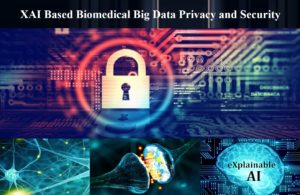 Biomedical data is faced with data leakage and data tampering in all links of collection, processing, and transmission. It has a great negative impact on personal reputation, personal privacy, and public opinion. The development of XAI can produce more interpretable methods, improve the prediction accuracy of the model, and enable users to understand, trust and make effective use of artificial intelligence. This special issue focuses on the data quality, privacy, security, and application management of biomedical data based on XAI in intelligent healthcare systems, aiming to promote the development of relevant fields and provide a safe environment for the next generation of smart healthcare.
Biomedical data is faced with data leakage and data tampering in all links of collection, processing, and transmission. It has a great negative impact on personal reputation, personal privacy, and public opinion. The development of XAI can produce more interpretable methods, improve the prediction accuracy of the model, and enable users to understand, trust and make effective use of artificial intelligence. This special issue focuses on the data quality, privacy, security, and application management of biomedical data based on XAI in intelligent healthcare systems, aiming to promote the development of relevant fields and provide a safe environment for the next generation of smart healthcare.
Distributed Big Data Intelligence in Instantaneous E-healthcare Services
Submission Deadline: 30 September, 2022
massive e-Health digital data. It provides Data Stream configuration and provisioning to facilitate data federation and aggregation over streaming paths, application flow associations, and e-Health message segmentation during processing. The Big data analysis of EMRs, EHRs, and other medical information is constantly aiding in enhancing more robust prognostic schemas.
Smart Sensing for Cardiac Health Monitoring and Heart Attack Prevention
Submission Deadline: 31 August, 2023
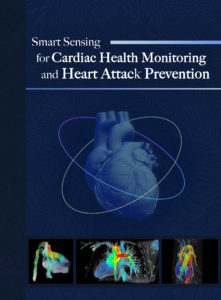
This Special Issue is created with an interdisciplinary approach, involving topics that cover (i) the main features in the field of cardiovascular sensors, and (ii) biomedical engineering analysis of this data for cardiac diagnostics and prognosis. We hope the high-quality research in this important field will have an impact on future disease management, and also hope to bring together a collection of both original research and review papers that cover modern technologies in all aspects of cardiovascular illnesses and heart attack prevention by using sensors and equipment. The special issue devoted to this topic will make significant contributions to the rapidly growing field of novel and innovative smart sensors for cardiovascular disorders and heart attack prevention. It will have a positive impact on the domain knowledge and practices for improving people’s quality of life.
Artificial Intelligence-Driven Biomedical Imaging Systems for Precision Diagnostic Applications
Submission Deadline: 31 October, 2022
Artificial intelligence (AI) is a revolutionary technology that enables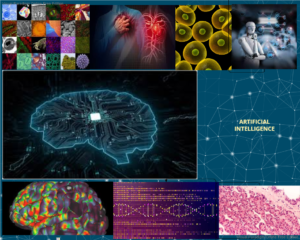 computational approaches to examine complex information. Diagnostic biomedical imaging is the most potential clinical implementation of AI, and increasing effort has been paid to develop and perfect its services to identify better and measure a range of clinical problems. AI-assisted diagnostic research has seen incredible precision, tolerance, and selectivity to identify minor radiological defects, potentially improving global health. Medical experts and clinicians can utilise AI to help them diagnose a wide range of illnesses using biomedical imaging.
computational approaches to examine complex information. Diagnostic biomedical imaging is the most potential clinical implementation of AI, and increasing effort has been paid to develop and perfect its services to identify better and measure a range of clinical problems. AI-assisted diagnostic research has seen incredible precision, tolerance, and selectivity to identify minor radiological defects, potentially improving global health. Medical experts and clinicians can utilise AI to help them diagnose a wide range of illnesses using biomedical imaging.
The biomedical sectors identified the possible uncertainties of this innovation at the start of the revolution. Biomedical imaging observations are among the most comprehensive and sophisticated data regarding individual patients. The need for AI in biomedical imaging is now being studied in depth. AI has shown excellent reliability and selectivity in discovering imaging disorders; It can enhance surface diagnosis and screening. It can also use AI to detect enlargement of particular muscle tissues, including the left ventricular membrane, and track changes in blood volume and flow through the cardiac and linked vessels. The systems and materials of AI’s possible benefits in the ecosystem of its special competence will be required. It will be difficult to draw the boundary between reliable diagnosis imaging and overtreatment. To enhance the performance and applicability of AI experiments, continuous employment of out-of-sample validation and well-defined subgroups are essential. AI could provide new ways to learn more perfect imaging alterations representing incompletely known illnesses.
Pervasive Computing for Healthcare
Submission Deadline: 1 June, 2023
Pervasive computing has revolutionized how we collect data and interact with information. Research interest in pervasive computing has been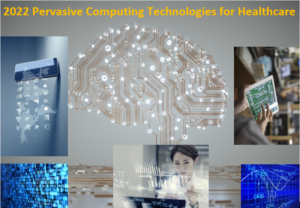 growing exponentially over the years, demonstrating enormous potential in biomedical applications ranging from a research-fertile field to clinical translation and healthcare delivery. The sophisticated capabilities of smartphones integrating diverse sensors along with wearable and non-wearable sensors provide the opportunity to collect longitudinal, multimodal data streams and facilitate near real-time monitoring. Moreover, these devices are becoming increasingly affordable and have already been embraced by many people, thus enabling large scale investigations and clinical trials. The collected data streams from these ubiquitous devices, coupled with emerging advances in data science and machine learning which enable fast and advanced processing of the collected datasets, lead to unprecedented opportunities for transforming healthcare. Along with these opportunities, there are new practical and social challenges, including data privacy, empowering individuals make decisions about their health trajectories, considerations regarding widening the gap with health inequalities, implementations at scale, and liability for the application and monitoring of data insights and outputs that can be extracted.
growing exponentially over the years, demonstrating enormous potential in biomedical applications ranging from a research-fertile field to clinical translation and healthcare delivery. The sophisticated capabilities of smartphones integrating diverse sensors along with wearable and non-wearable sensors provide the opportunity to collect longitudinal, multimodal data streams and facilitate near real-time monitoring. Moreover, these devices are becoming increasingly affordable and have already been embraced by many people, thus enabling large scale investigations and clinical trials. The collected data streams from these ubiquitous devices, coupled with emerging advances in data science and machine learning which enable fast and advanced processing of the collected datasets, lead to unprecedented opportunities for transforming healthcare. Along with these opportunities, there are new practical and social challenges, including data privacy, empowering individuals make decisions about their health trajectories, considerations regarding widening the gap with health inequalities, implementations at scale, and liability for the application and monitoring of data insights and outputs that can be extracted.
Distributed Big Data Intelligence in Instantaneous E-healthcare Services
Submission Deadline: 30 June, 2022
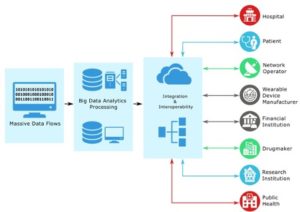
Generally, big data in healthcare applies to large, complex e-health datasets that seem challenging to handle with typical data management hardware, software, and procedures. Clinical details of doctors, their prescriptions, laboratory data, CT pictures, insurance files, MRI images, and other data associated with administrative applications, EPR data, drugstore documents, and soon are all types of big data healthcare. The development and application of ML technologies promote the efficient use of Big Data in e-Healthcare. ML and AI approaches are sometimes used interchangeably. Allowing remote electronic accessibility and easy data processing, EHRs make patient data more available to patients, providers, and researchers. Incorporation of EHRs with diagnostic tests like genomic sequencing, MRIs, etc., gives ample platform for Big Data because it aids doctors to know the genetic reasons of cancers better and thus promotes more adequate treatment procedures and enhance screening and prevention measures. Oncology treatment, in particular, shows how Big Data can directly help patient care.
Trustworthy and Collaborative AI for Personalised Healthcare Through Edge–of–Things
Submission Deadline: 31 September, 2022
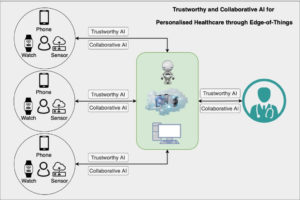 Benefiting from the encouraging results of AI on Big Data, AI for personalised healthcare through Edge-of-Things will pave the way for intelligent health-related applications on edge devices, such as smart sensors and wearable devices. However, the variety and complexity of the data require the provision of new AI models and technologies able to process and analyse them in a trustworthy and collaborative way. In this regard, the characteristics of trust and collaboration in AI systems are highly valuable for applying AI to personalised healthcare services. Trustworthy and collaborative AI is designed to encourage transparent, reliable, and unbiased AI systems and ensure their adequacy to tackle predictive and prescriptive healthcare problems. For this purpose, such AI systems need to be able to understand what’s wrong, figure out how to overcome the resulting problems, involve human intelligence in the discovery process, and then take what they have learnt to overcome those challenges for the future. This special issue intends to facilitate advancements in all state-of-the-art trustworthy and collaborative AI techniques for personalised healthcare, and establish a new era of healthcare systems with AI.
Benefiting from the encouraging results of AI on Big Data, AI for personalised healthcare through Edge-of-Things will pave the way for intelligent health-related applications on edge devices, such as smart sensors and wearable devices. However, the variety and complexity of the data require the provision of new AI models and technologies able to process and analyse them in a trustworthy and collaborative way. In this regard, the characteristics of trust and collaboration in AI systems are highly valuable for applying AI to personalised healthcare services. Trustworthy and collaborative AI is designed to encourage transparent, reliable, and unbiased AI systems and ensure their adequacy to tackle predictive and prescriptive healthcare problems. For this purpose, such AI systems need to be able to understand what’s wrong, figure out how to overcome the resulting problems, involve human intelligence in the discovery process, and then take what they have learnt to overcome those challenges for the future. This special issue intends to facilitate advancements in all state-of-the-art trustworthy and collaborative AI techniques for personalised healthcare, and establish a new era of healthcare systems with AI.
Interpretable Deep learning (IDL) in Co-Clinical Non-invasive Radiological Image
Submission Deadline: 31 October, 2022
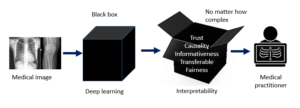
Recently, deep learning (DL) has achieved outstanding performance in academic and industrial research, and become a vital utensil in a wide range of medical image computing tasks, including cancer detection, tumor segmentation, tumor classification, vessel segmentation, and cancer prediction. But, it is still not clear how information delivered through DL models, and how DL models work to a rapid, safe and robust prediction. Hence, experts/users wanted to know interpretation of DL model rather than black box nature, and the latest research advances of interpretable deep learning (IDL). This critical research topic will bring new challenges and opportunities to the new age AI community. The purpose of this special issue aims to provide a diverse, but complementary, set of contributions to demonstrate new developments and applications of interpretable deep learning, to solve the problems of automatic analysis of medical image.
Computational Mathematics Modeling in Cancer Analysis
Submission Deadline: 31 December, 2022

Cancer is a complex and heterogeneous disease which often leads to misdiagnosis and ineffective treatment strategies. Many mathematical and computational approaches have been implemented in basic cancer research and clinical diagnosis/therapy over the past few decades. Motivated by rigorous mathematical theory and biological mechanisms, the advanced computational methods for cancer data analysis are robust and clinically practicable, which will be strong interpretability combining clinical data and algorithms in an era of artificial intelligence. Moreover, these methods also allow a deeper exploration of cancer from the perspective of computational science, such as the mapping of biological and computational correlations among multiple omics data at various scales and views. The multimodal cancer data include but are not limited to radiographic, pathology, genomics, and proteomics. The goal of this Special Issue is to publish the latest research advancements in theoretical, computational, and applied aspects of computational mathematics in cancer data analysis for cancer research and clinical diagnosis/therapy.
This Special Issue is in cooperation with the 1st WORKSHOP on Computational Mathematics Modeling in Cancer Analysis (CMMCA2022) to be held in conjunction with the MICCAI2022 , along with papers submitted within the open call.
Camera-based Health Monitoring in Real-world Scenarios
Submission Deadline: 31 December, 2022
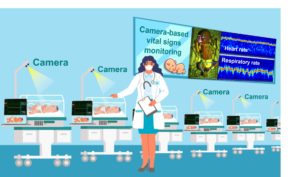 “Remote cameras have been used to measure physiological signals from human face and body, thereby eliminating mechanical contact with the skin that are common in wearable sensors. Advancements in biomedical optics, computer vision and AI enabled various camera-based measurements, including vital signs like heart rate, respiration rate, SpO2, blood pressure, and physiological markers/indicators that have diagnostic capabilities. Image and video analysis also permit the measurement of human semantics, context and behaviours that provide new insights into health informatics (e.g. facial analysis for pain or delirium assessment), which is an unique advantage of camera sensors as compared to biomedical sensors. Camera-based health monitoring will bring a rich set of compelling healthcare applications that directly improve upon contact-based monitoring solutions in various scenarios like clinical units (e.g. ICU, NICU) and assisted-living homes (e.g. senior center, confinement center), impacting people’s care experience and quality of life. After years of R&D in this field, it is time to bring the concepts and prototypes (setup and algorithms) from labs to real-world scenarios to demonstrate their actual performance and societal values with concrete use cases like clinical trials and pre-development showcases. This special issue focuses on the latest developments and technologies pertaining to Camera-based Health Monitoring in Real-world Scenarios, specifically on innovation, validation and demonstration in healthcare applications.”
“Remote cameras have been used to measure physiological signals from human face and body, thereby eliminating mechanical contact with the skin that are common in wearable sensors. Advancements in biomedical optics, computer vision and AI enabled various camera-based measurements, including vital signs like heart rate, respiration rate, SpO2, blood pressure, and physiological markers/indicators that have diagnostic capabilities. Image and video analysis also permit the measurement of human semantics, context and behaviours that provide new insights into health informatics (e.g. facial analysis for pain or delirium assessment), which is an unique advantage of camera sensors as compared to biomedical sensors. Camera-based health monitoring will bring a rich set of compelling healthcare applications that directly improve upon contact-based monitoring solutions in various scenarios like clinical units (e.g. ICU, NICU) and assisted-living homes (e.g. senior center, confinement center), impacting people’s care experience and quality of life. After years of R&D in this field, it is time to bring the concepts and prototypes (setup and algorithms) from labs to real-world scenarios to demonstrate their actual performance and societal values with concrete use cases like clinical trials and pre-development showcases. This special issue focuses on the latest developments and technologies pertaining to Camera-based Health Monitoring in Real-world Scenarios, specifically on innovation, validation and demonstration in healthcare applications.”
AIoPT (Artificial Intelligence of Paediatric Things): Informatics in Meeting Paediatric Needs
Submission Deadline: 30 September, 2022
AIoPT (Artificial Intelligence of Paediatric Things) enabled Preventive,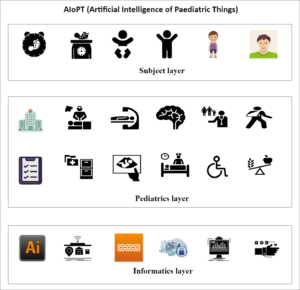 Assistive, and Medical Children Health Informatics (PAMCHI) aims to address the aforesaid areas as well as analyze current issues in the fields of paediatric training, quality, and informatics. The authors, who are experts in a variety of paediatric settings (hospital medicine, intensive care, emergency medicine, clinical informatics, nursing, and quality improvement research), provide an overview to help practicing pediatricians broaden their knowledge base and apply the content of these articles to their daily practice.
Assistive, and Medical Children Health Informatics (PAMCHI) aims to address the aforesaid areas as well as analyze current issues in the fields of paediatric training, quality, and informatics. The authors, who are experts in a variety of paediatric settings (hospital medicine, intensive care, emergency medicine, clinical informatics, nursing, and quality improvement research), provide an overview to help practicing pediatricians broaden their knowledge base and apply the content of these articles to their daily practice.
AI-powered models and digital twins for personalized healthcare
Submission Deadline: 31 August, 2022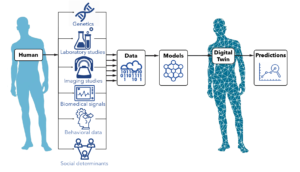
The introduction of Digital Twins (DT) is anticipated to radically distrupt clinical practice towards personalized medicine, since it will allow rapid decision making and prognosis at a simulation level, without touching the patient. On the other hand, developing a Digital Twin of a human body is a very demanding and complex process that still remains unrevealed. The wealth of medical data, collected today from both medical (i.e. hospitals, laboratories, etc.) and non-medical (i.e. home, outdoors) environments, opens new roads in the area of AI-powered medicine that needs to be explored Furthermore, digital twins offer a different focus than precision medicine, which was already considered in previous JBHI issues. Specifically, DT look at modeling the individual as a whole, rather than answering questions that rely mainly on the systems biology realm. Consequently, we believe that this special issue will be a significant addition, and it will attract very interesting submissions and the interest of the majority of JBHI readers.
Advancing Biomedical Discovery and Healthcare Delivery Through Digital Technologies
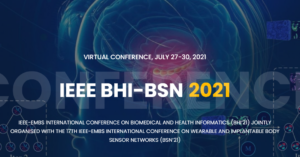 Submission Deadline: 15 February, 2022
Submission Deadline: 15 February, 2022
The digital revolution has been transforming biomedicine across the whole continuum, from scientific discovery to clinical translation and healthcare delivery. The rapid advances in artificial intelligence coupled with new data generation technologies and new hardware accelerators are influencing the biomedical discovery process, from data-driven hypothesis generation, to design of virtual experiments, to generating surrogate models of complex biological and healthcare systems, to automating healthcare delivery. This Special Issue is related to the IEEE-EMBS International Conference on Biomedical and Health Informatics (BHI 2021).
Medical Image Analysis Embedded on Microprocessors
Submission Deadline: 1 March, 2022
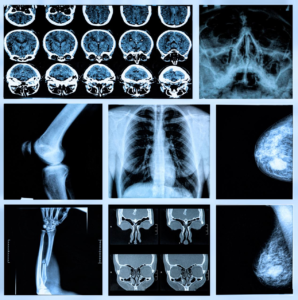 The coordination between embedded microprocessor and wireless transmission is becoming more and more important for telemedicine, especially for medical image lesion detection technology. Using image processing technology to analyze and process two-dimensional slice images can help doctors make qualitative or even qualitative analysis of lesions and other areas of interest, thus significantly improving the accuracy and reliability of medical diagnosis. Embedded medical image lesion detection is advantageous of small volume, low cost, good stability, and strong adaptability. Applied to medical image recognition and diagnosis, it can significantly reduce the burden of doctors on massive and complex medical image data and help doctors diagnose diseases that are difficult to find.
The coordination between embedded microprocessor and wireless transmission is becoming more and more important for telemedicine, especially for medical image lesion detection technology. Using image processing technology to analyze and process two-dimensional slice images can help doctors make qualitative or even qualitative analysis of lesions and other areas of interest, thus significantly improving the accuracy and reliability of medical diagnosis. Embedded medical image lesion detection is advantageous of small volume, low cost, good stability, and strong adaptability. Applied to medical image recognition and diagnosis, it can significantly reduce the burden of doctors on massive and complex medical image data and help doctors diagnose diseases that are difficult to find.
The role of Digital Twin in Healthcare: Current Trends and Challenges
Submission Deadline: 28 February, 2022
The role of Digital Twin in healthcare is changing from evolution to revolution. With a digital twin, a hospital can be virtualized to create a safe environment, which verifies the influences of changes on the performance of the organizational and structural system without risk. It is extremely important in the healthcare sector, as it enables informed strategic decisions to be made in a highly complex and sensitive environment. But digital twin technology can also be used to represent the genome, physiological characteristics and lifestyle of an individual in order to personalize medicine fully. A digital twin of a human body can allow doctors to discover the pathology before the disorders are evident, experiment with treatments and better prepare for surgery. In this special issue, we are looking for Digital Twin innovation also driven by Artificial Intelligence.
Multimodal Learning in Medical Imaging and Informaics
Submission Deadline: 15 Jan, 2022
Large amounts of health-related data are produced daily, such as those from personal devices, e.g., fitness trackers or mobile applications, ambient sensors, clinical data in electronic health records, pathology reports, lab results, and medical images, and voice recordings, etc. The practice of modern medicine increasingly relies on data from multiple sources to guide better care. Modern data science, analytics, machine learning, and artificial intelligence-based tools embedded with self-learning mechanisms offer the promise to revolutionize/remodel medicine and patient care. Multimodal learning mechanisms that take advantage of the multitude of data sources are instrumental in realizing that promise. In this special issue, we invite novel research contributions describing tools and techniques that integrate multiple data types to describe a particular medical event/case toward developing higher confidence in their decision-making and guidance. Derivation of meaningful data from an intelligent fusion of medical imagery and electronic health records is an example of multimodal learning.
Federated Learning for privacy preservation of Healthcare data in Internet of Medical Things
Submission Deadline: 15 Feb, 2022
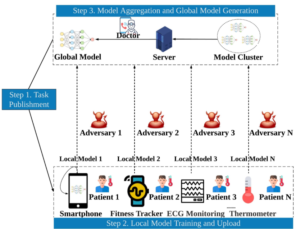 The following are the steps for the application of federated learning for Internet of Medical Things
The following are the steps for the application of federated learning for Internet of Medical Things
- The medical data of patients generated from IoMT devices like smartphones, wearable devices, ECG monitoring device, etc. are stored on local devices.
- The machine learning models, which are distributed to the clients, as part of the federated model, will be applied on the local devices to understand the patterns from the data.
- Instead of sending the entire raw data to the central server, only model parameters/gradients are sent to the global server, thus preserving the privacy of the medical data by not exposing them to adversaries while transmitting to the global server.
- The parameters/gradients aggregated from all the clients will be trained at the central server for global predictions.
Innovations in Wearable, Implantable, Mobile, & Remote Healthcare with IoT & Sensor Informatics
Submission Deadline: 15 Dec, 2021
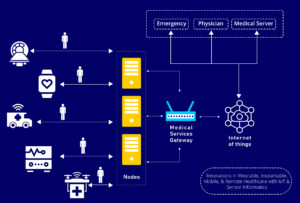 Wearable, implantable, mobile and remote healthcare applications offer innovative solutions for healthcare problems. This is because sensors associated with mobile and wearable devices monitor everything from patient body movements to the electrical activity of the heart on a daily routine. As a result, the data collected from the wearable and implanted devices becomes indispensable for the advanced research on healthcare informatics to manage illness and improve patient health. The data obtained from these devices have a direct impact on clinical decision making. From a technical perspective, the big data generated from wearable, mobile, and healthcare applications provide both challenges and opportunities for researchers to effectively use it for future healthcare applications. Issues such as data complexity, security, and ethical issues are among the top priority. At the same time, enhanced usability of these data helps to better understand the major public health issues and unaddressed chronic health conditions. This special issue intends to apply for advances in sensor informatics to effectively analyses the plethora of data they generate and effectively use it for public health welfare with enhanced security and ethical regulations.
Wearable, implantable, mobile and remote healthcare applications offer innovative solutions for healthcare problems. This is because sensors associated with mobile and wearable devices monitor everything from patient body movements to the electrical activity of the heart on a daily routine. As a result, the data collected from the wearable and implanted devices becomes indispensable for the advanced research on healthcare informatics to manage illness and improve patient health. The data obtained from these devices have a direct impact on clinical decision making. From a technical perspective, the big data generated from wearable, mobile, and healthcare applications provide both challenges and opportunities for researchers to effectively use it for future healthcare applications. Issues such as data complexity, security, and ethical issues are among the top priority. At the same time, enhanced usability of these data helps to better understand the major public health issues and unaddressed chronic health conditions. This special issue intends to apply for advances in sensor informatics to effectively analyses the plethora of data they generate and effectively use it for public health welfare with enhanced security and ethical regulations.
Special Issue on “Neuro-Fuzzy Edge Computations for Next-generation Internet of Medical Things”
Submission Deadline: 30 Sep, 2021
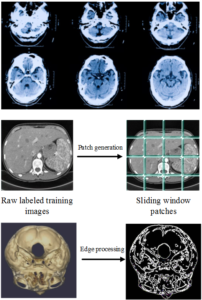 With the advent of advanced machine learning techniques, neural networking along with fuzzy logic and other artificial intelligence models evolves as a revolutionary technology in the field of Internet of Things (IoT), Industrial IoT (IIoT), and various smart applications. Nevertheless, the next-generation Internet of Medical Things (Nx-IoMT) arrives as the IoT solutions for smart health and other medical industry applications. Nx-IoMT is made up of various IoMT features along with smart fuzzy-edge and Neuro-edge computing models for human-to-machine and machine-to-human solutions that can be used for remote monitoring and diagnosis with medical guidelines.
With the advent of advanced machine learning techniques, neural networking along with fuzzy logic and other artificial intelligence models evolves as a revolutionary technology in the field of Internet of Things (IoT), Industrial IoT (IIoT), and various smart applications. Nevertheless, the next-generation Internet of Medical Things (Nx-IoMT) arrives as the IoT solutions for smart health and other medical industry applications. Nx-IoMT is made up of various IoMT features along with smart fuzzy-edge and Neuro-edge computing models for human-to-machine and machine-to-human solutions that can be used for remote monitoring and diagnosis with medical guidelines.
Open and Interpretable AI in Computational Pathology
Submission Deadline: 20 February, 2022
 The existing deep learning models, are less interpretable, i.e., neither provide explanations nor trustworthy for the predictions. Furthermore, several other challenges exist, such as ethical, legal, social, and technological issues of the existing AI. Trustworthy and explainability in AI tools based on Deep Learning (DL) is an emerging field of research with great promise for increased high-quality healthcare. Particularly, it refers to AI/DL tools and techniques that produce human-comprehensible solutions, i.e., provide explanations and interpretations for disease diagnosis and predictions, as well as recommended actions.
The existing deep learning models, are less interpretable, i.e., neither provide explanations nor trustworthy for the predictions. Furthermore, several other challenges exist, such as ethical, legal, social, and technological issues of the existing AI. Trustworthy and explainability in AI tools based on Deep Learning (DL) is an emerging field of research with great promise for increased high-quality healthcare. Particularly, it refers to AI/DL tools and techniques that produce human-comprehensible solutions, i.e., provide explanations and interpretations for disease diagnosis and predictions, as well as recommended actions.
Special Issue on Skin Image Analysis in the Age of Deep Learning
Submission Deadline: 15 Nov, 2021
 With the release of large public datasets, development of novel learning algorithms and network architectures with open-source implementations, and the availability of powerful and inexpensive graphics processing units, deep learning has become the technique of choice in a wide variety of medical image analysis problems over the past decade. Skin image analysis is no exception, as demonstrated by the large number of deep learning-based contributions/entries submitted to our past five ISIC Workshops/Challenges. The goals of this special issue are to facilitate advancements and knowledge dissemination in deep learning-based skin image analysis, raising awareness and interest for these socially valuable tasks.
With the release of large public datasets, development of novel learning algorithms and network architectures with open-source implementations, and the availability of powerful and inexpensive graphics processing units, deep learning has become the technique of choice in a wide variety of medical image analysis problems over the past decade. Skin image analysis is no exception, as demonstrated by the large number of deep learning-based contributions/entries submitted to our past five ISIC Workshops/Challenges. The goals of this special issue are to facilitate advancements and knowledge dissemination in deep learning-based skin image analysis, raising awareness and interest for these socially valuable tasks.
Special Issue on “Artificial Intelligence in Pre-DICOM”
Submission Deadline: 30 Nov, 2021
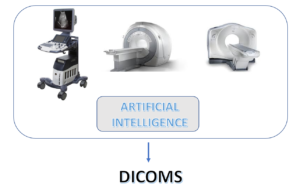
Artificial intelligence (AI) for medical imaging is applied in three domains: pre-DICOM, pre-processing and clinical applications. Clinical applications mainly cover topics such as disease detection, classification, segmentation, registration. Pre-processing components are mainly designed for facilitating applications using image transformation such as image normalization, noise reduction, bias correction in MR. AI in the pre-DICOM domain is expected to improve imaging workflow, image protocol selection, imaging quality, imaging scanning time before images are converted into DICOM format for radiologists to review. The trends of AI publications in medical imaging have been gradually extended from clinical applications to pre-processing and, to pre-DICOM. In this special issue, we are looking for pre-DICOM innovations driven by AI.
Cognitive Cyber-Physical Systems with AI Based Solutions in Medical Informatics
Submission Deadline: 15 December, 2021
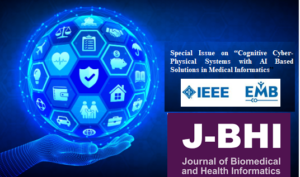 Cognitive Cyber-Physical Systems (CCPS) are witnessing in rapid transformation as an interdisciplinary technology that blends physical components and computing devices to enable the Artificial Intelligence (AI) based solutions. CCPS will be playing a significant role that integrates machine learning/AI techniques and resulted in dramatic improvements for medical informatics and the future of human-augmentation i.e., Cyber-Physical-Human Medical Systems (CPHMS). CPHMS are coordinating supervisory medical systems and medical resource everywhere; there is a great scope towards health consciousness and healthy society. Medical Cyber-Physical Systems (MCPS) in healthcare towards critical integration in network of medical devices.
Cognitive Cyber-Physical Systems (CCPS) are witnessing in rapid transformation as an interdisciplinary technology that blends physical components and computing devices to enable the Artificial Intelligence (AI) based solutions. CCPS will be playing a significant role that integrates machine learning/AI techniques and resulted in dramatic improvements for medical informatics and the future of human-augmentation i.e., Cyber-Physical-Human Medical Systems (CPHMS). CPHMS are coordinating supervisory medical systems and medical resource everywhere; there is a great scope towards health consciousness and healthy society. Medical Cyber-Physical Systems (MCPS) in healthcare towards critical integration in network of medical devices.
Submission Deadline: 30 March, 2022
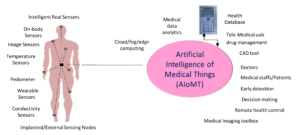 The rapid advances in the Internet of Things (IoT) and the needs to distributed intelligence and artificial intelligence of things (AIoT) in sensor systems have brought some new challenges of big e-health data with itself where massive data are collected by different medical and healthcare monitoring sensors. The health sensing technologies have become more demandable in IoT-based healthcare systems for a development, testing, and trials such that they should be a part of both clinics and homes to reach the concept of smart monitoring of patients. This special issue wishes to give a deep perception on how to sense, process, and intelligently communicate biomedical data through remote access.
The rapid advances in the Internet of Things (IoT) and the needs to distributed intelligence and artificial intelligence of things (AIoT) in sensor systems have brought some new challenges of big e-health data with itself where massive data are collected by different medical and healthcare monitoring sensors. The health sensing technologies have become more demandable in IoT-based healthcare systems for a development, testing, and trials such that they should be a part of both clinics and homes to reach the concept of smart monitoring of patients. This special issue wishes to give a deep perception on how to sense, process, and intelligently communicate biomedical data through remote access.
Advanced Wearable Sensors for Smart Monitoring and Disease Prediction
Submission Deadline: 31 August, 2021
 The outbreak of different types of heath disease such as COVID-19 is in its growing stage due to the lack of standard diagnosis for the patients. The situation of any populous area in a geographic location is very critical due to the quick virus spread from an infected individual to the rest. Currently, medical administration is at a crisis point due to the rapidly increasing number of cases and limited medical facilities. Thus, it is time to explore and design an intelligent model to monitor patient health symptoms remotely and predict and detect the abnormality of the patient’s health status in quick succession. Thus, the health status of a critical patient can be identified via a well-adjusted predictive model by analyzing the observed parameters of the health. This special issue focus on discussions and insights into the latest advancements and technologies about advanced wearable sensors for smart sensing and disease prediction, specifically on design, theory, modelling, manufacturing, fabrication, data analysis, analytics, and applications of advanced wearable sensors used in disease prediction, forecasting, or monitoring the health symptoms with advanced AI-enabled technologies such as machine learning and deep learning techniques.
The outbreak of different types of heath disease such as COVID-19 is in its growing stage due to the lack of standard diagnosis for the patients. The situation of any populous area in a geographic location is very critical due to the quick virus spread from an infected individual to the rest. Currently, medical administration is at a crisis point due to the rapidly increasing number of cases and limited medical facilities. Thus, it is time to explore and design an intelligent model to monitor patient health symptoms remotely and predict and detect the abnormality of the patient’s health status in quick succession. Thus, the health status of a critical patient can be identified via a well-adjusted predictive model by analyzing the observed parameters of the health. This special issue focus on discussions and insights into the latest advancements and technologies about advanced wearable sensors for smart sensing and disease prediction, specifically on design, theory, modelling, manufacturing, fabrication, data analysis, analytics, and applications of advanced wearable sensors used in disease prediction, forecasting, or monitoring the health symptoms with advanced AI-enabled technologies such as machine learning and deep learning techniques.
Advanced machine learning algorithms for biomedical data and imaging
Submission Deadline: 31 January, 2022
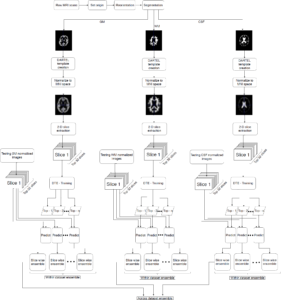 Researchers in machine learning including those working in computer vision, image processing, biomedical analysis, and related fields when tied with experienced clinicians can play a significant role in understanding
Researchers in machine learning including those working in computer vision, image processing, biomedical analysis, and related fields when tied with experienced clinicians can play a significant role in understanding
and working on complex medical data which ultimately improves patient care. Developing a novel machine-learning algorithm specific to medical data is a challenge and need of the hour. Healthcare and biomedical sciences have become data-intensive fields, with a strong need for sophisticated data mining methods to extract the knowledge from the available information.
AI-driven Synthetic Biology for Human Wellbeing
Submission Deadline: 30 Sept, 2021
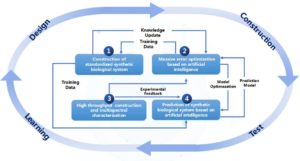 Construction of AI-driven engineering platform is an important research method of synthetic biological system. Through data driven and continuous learning, the deep integration of artificial intelligence and synthetic biology is the general trend, which brings new opportunities for the development of synthetic biology. In this special issue, we are looking for emerging technologies, novel studies, and promising developments, which can realize and elevate the effectiveness and advantages of AI-driven synthetic biology for human wellbeing.
Construction of AI-driven engineering platform is an important research method of synthetic biological system. Through data driven and continuous learning, the deep integration of artificial intelligence and synthetic biology is the general trend, which brings new opportunities for the development of synthetic biology. In this special issue, we are looking for emerging technologies, novel studies, and promising developments, which can realize and elevate the effectiveness and advantages of AI-driven synthetic biology for human wellbeing.
Large scale video analytics for clinical decision support
Submission Deadline: 2nd Mar, 2022
Biomedical videos are generated at unprecedented rates. Example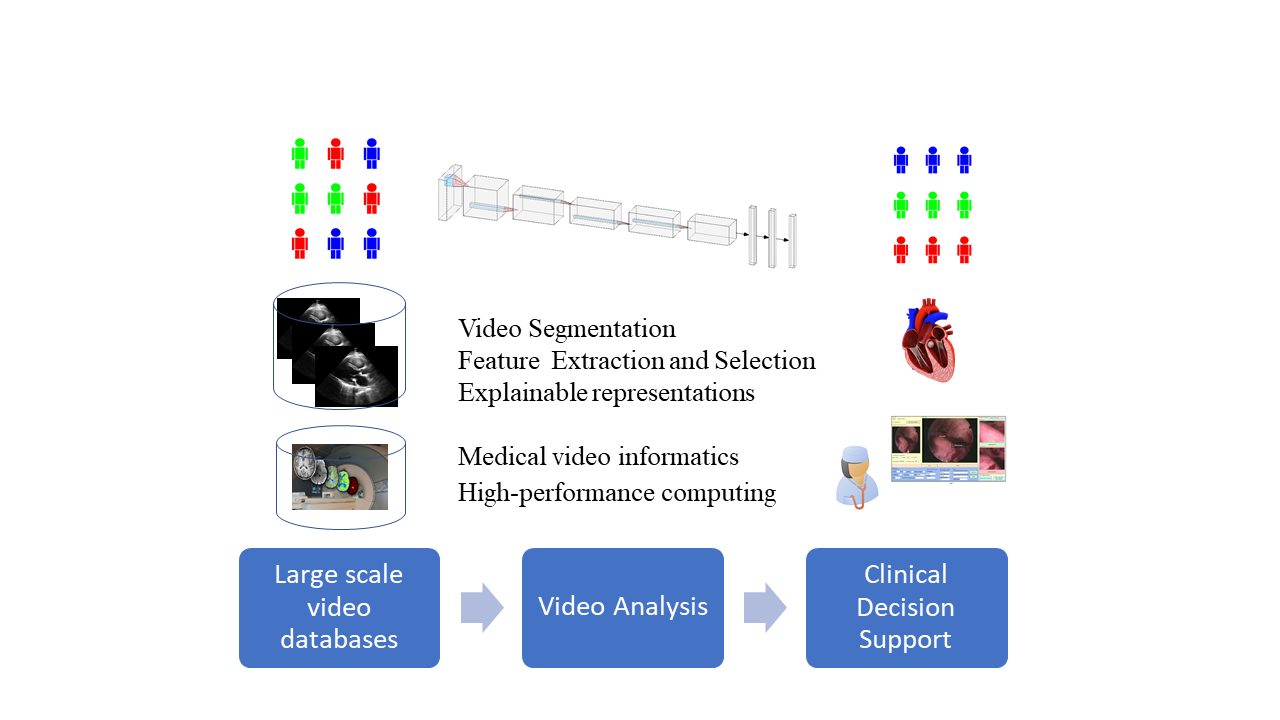 applications include diagnostic, surgical and capsule endoscopy, cardiac ultrasound, gait analysis, video microscopy, video angioscopy, and clinical education. In clinical practice, biomedical videos are reviewed by clinical experts and then stored away, not to be observed or utilized again. The resulting large collections of biomedical videos present a unique opportunity for the development of artificial intelligence (AI), machine learning and deep learning diagnostic systems that can be trained and tested on large-scale biomedical video databases. This special issue will address several challenges associated with the development of Computer-Aided Diagnostic Systems that are based on the use of large-scale biomedical video analysis methods. Critical challenges include the development of fast and reliable methods for biomedical video analysis, the effective storage and retrieval of large-scale biomedical video databases, the effective use of multi-scale techniques in space and time, the effective use of biomedical videos in multimodal representations, the development of explainable methods, and high-performance computing methods for processing large-scale video databases.
applications include diagnostic, surgical and capsule endoscopy, cardiac ultrasound, gait analysis, video microscopy, video angioscopy, and clinical education. In clinical practice, biomedical videos are reviewed by clinical experts and then stored away, not to be observed or utilized again. The resulting large collections of biomedical videos present a unique opportunity for the development of artificial intelligence (AI), machine learning and deep learning diagnostic systems that can be trained and tested on large-scale biomedical video databases. This special issue will address several challenges associated with the development of Computer-Aided Diagnostic Systems that are based on the use of large-scale biomedical video analysis methods. Critical challenges include the development of fast and reliable methods for biomedical video analysis, the effective storage and retrieval of large-scale biomedical video databases, the effective use of multi-scale techniques in space and time, the effective use of biomedical videos in multimodal representations, the development of explainable methods, and high-performance computing methods for processing large-scale video databases.
A Secured and Privacy-preserved Smart Health Monitoring and Improvement System
Submission Deadline: 30 April, 2021

The objective of this special issue is to attract high-quality research and survey articles that promote research and reflect the most recent advances in addressing the security and privacy issues of the medical data for smart healthcare applications. We welcome researchers from both academia and industry to provide their state-of-the-art technologies and ideas covering all aspects of security and privacy solutions for the applications.
Emerging IoT-driven Smart Health: from Cloud to Edge
Submission Deadline: 30 June, 2021

This special issue focuses on smart sensors challenges in IoMT, and solutions that leverage techniques and insights from the domains of artificial intelligence, edge computing, and IoT. Specifically, it also solicits high quality contributions investigating the usage of biometric signals in the context of IoMT for continuous monitoring for patient-centric healthcare.
Augmented Reality for Bioinformatics
Submission Deadline: 1 Aug, 2021
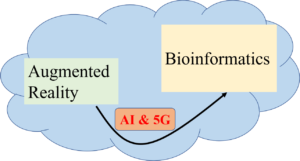
Augmented Reality is a key technology that will facilitate a major paradigm shift in the way users interact with data and has only just recently been recognized as a viable solution for solving many critical needs, especially in the age of artificial intelligence (AI). AR can be used to visualize data from hundreds of sensors simultaneously, overlaying relevant and actionable information over your environment through a headset. Bioinformatics-related research produces huge heterogeneous amounts of data. This wealth of information includes data describing metabolic mechanisms and pathways, proteomics, transcriptomics, and metabolomics. In summary, AR is a cool upcoming wave that will be associated with Bioinformatics, where the vast repositories of data will enable an AR lens into the scenarios in ways that provide near-immediate insight at a level of depth unimaginable previously. As a result, this special session aims to bring the latest results over Bioinformatics and Augmented Reality technologies for both academia and industry. It can help technicians to exchange the latest technical progress.
Emerging Challenges for Deep Learning
Submission Deadline: 1 Nov, 2021
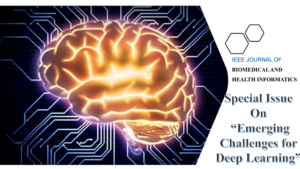
Due to the proliferation of biomedical imaging modalities such as Photoacoustic Tomography, Computed Tomography (CT), Optical Microscopy and Tomography, Single Photon Emission Computed Tomography (SPECT), Magnetic Resonance (MR) Imaging, Ultrasound, and Positron Emission Tomography (PET), Magnetic Particle Imaging, EE/MEG, Electron Tomography and Atomic Force Microscopy, massive amounts of biomedical and health informatics data are being generated on a daily basis. How can we utilize such big data to build better health profiles and better predictive models so that we can better diagnose and treat diseases and provide a better life for humans? In the past years, many successful learning methods such as deep learning were proposed to answer this crucial question, which has social, economic, as well as legal implications.
A number of significant problems plague the processing of big biomedical and health informatics data, such as data heterogeneity, data incompleteness, data imbalance, and high dimensionality. What is worse is that many data sets exhibit multiple such problems. A majority of existing learning methods can only deal with homogeneous, complete, class-balanced, and moderate-dimensional data. Therefore, data preprocessing techniques including data representation learning, dimensionality reduction, and missing value imputation should be developed to enhance the applicability of deep learning methods in real-world applications of biomedicine and health informatics.
This special issue aims to provide a diverse, but complementary set of contributions to demonstrate new developments and applications that covers existing above issues in data processing of big biomedical and health informatics data. We would also like to accept successful applications of the new methods, including but not limited to data processing, analysis and knowledge discovery of biomedical and health informatics data.
AI-driven Informatics, Sensing, Imaging and Big Data Analytics for Fighting the COVID-19 Pandemic

Submission Deadline: Continuous up to June 30th, 2022
On March 12th 2020, the World Health Organization (WHO) announces COVID-19 (COronaVIrus Disease 2019) outbreak as a pandemic. This global pandemic is caused by a new coronavirus named severe acute respiratory syndrome coronavirus 2 (SARS-CoV-2), which was first discovered in December 2019 in China. Until December 2020, COVID-19 has infected more than 68 millions of people and the reported deaths are more than 1.5 million globally. Seniors and people with suppressed immune system or chronic diseases are at higher risk. Finally, almost 4 billion of people stay at home. Under these extremely urgent circumstances, we have decided to extend the submission deadline for this Special Issue until December 31st, 2021.
This Special Issue aims (1) to encourage the stakeholders relating to COVID-19 to share data source, data harmonization, and tools, which can speed up COVID-19 research for years to come; (2) to inspire new informatics method development for rapid testing of virus in humans; (3) to present advanced informatics solutions that utilize machine learning and artificial intelligence methods such as deep learning to analyze COVID-19 data for diagnosis, treatment, and prognosis; (4) to develop computational models and tools to track virus propagation and recurrence; and (5) to model outbreaks for policy makers for better decision making. Informatics goals include data harmonization, data quality control, multi-modality data integration, advanced analysis pipeline such as deep learning, causal inference, real-time decision making, and interpretable models. Researchers, who are using informatics to address COVID – 19 issues are encouraged to submit high quality data and unpublished work. The submitted manuscripts will be processed through a fast track procedure, and the time from submission to first decision will be limited to 15 days.
Upcoming Special Issues
Generative Adversarial Networks in Biomedical Image Computing
Submission Deadline: 15 Feb, 2021
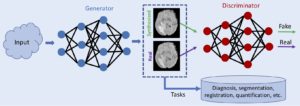
Generative adversarial networks (GANs) have received broad interest in computer vision due to their capability for data generation or data translation. Currently, GAN has been rapidly adopted in many applications cross healthcare and biomedicine, addressing problems in image reconstruction, segmentation, classification, and cross-modality synthesis. Despite GAN substantial progress in these areas, their application to medical image computing still faces several challenges. For example, how to synthesize realistic or physically-plausible imagery from small datasets? What are the best GAN architectures and loss functions for specific image computing tasks? When is possible to conduct unsupervised/weak versus supervised deep learning? How to deal with noisy and incomplete data? How to deal with data that is only partially labelled or annotated? How to ensure that learning from GAN-synthesized data generalizes to real-world data? How to develop GAN architectures that integrate biomedical imaging with other biomedical data like omics, radiological text reports, electronic health records, etc.? The goal of this special issue is to attract and highlight the latest developments in GANs for biomedical data processing, and overview the state-of-the-art methods and algorithms at the forefront of using GANs in biomedical image computing.
Data analytics for Public Health Care
Submission Deadline: 28 Feb, 2021
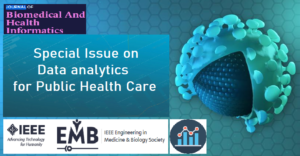 Data analytics for Public Health Care has been a pressing challenge for years. Public Health Care organizations must be able to manage, analyze, and interpret data in order to identify the best ways to deliver high quality care. There are a wide range of tools for data analytics in health care, with clinical and operational applications to help organizations capture health data for advancing medical care. Health care data is collected from a variety of systems and devices, such as online patient portals, electronic medical records and health tracking devices. As a result, data exists in different formats, from clinical notes to medical images and at times, the data is unstructured. Data governance covers master data management, which ties master data in a single and reliable source of data to be used for care improvement and patient safety. Data analytics refers to analysis of the data in some way using quantitative and qualitative techniques to be able to explore for trends and patterns in the data. Health data analysts should have the advanced knowledge “to acquire, manage, analyze, interpret, and transform data into accurate, consistent, and timely information”. This special issue aims to consolidate recent advances in data analytics for public health care, research in theory and applications. Pilot studies in analytics-enabled healthcare are especially welcome.
Data analytics for Public Health Care has been a pressing challenge for years. Public Health Care organizations must be able to manage, analyze, and interpret data in order to identify the best ways to deliver high quality care. There are a wide range of tools for data analytics in health care, with clinical and operational applications to help organizations capture health data for advancing medical care. Health care data is collected from a variety of systems and devices, such as online patient portals, electronic medical records and health tracking devices. As a result, data exists in different formats, from clinical notes to medical images and at times, the data is unstructured. Data governance covers master data management, which ties master data in a single and reliable source of data to be used for care improvement and patient safety. Data analytics refers to analysis of the data in some way using quantitative and qualitative techniques to be able to explore for trends and patterns in the data. Health data analysts should have the advanced knowledge “to acquire, manage, analyze, interpret, and transform data into accurate, consistent, and timely information”. This special issue aims to consolidate recent advances in data analytics for public health care, research in theory and applications. Pilot studies in analytics-enabled healthcare are especially welcome.
Submission Deadline: 30 May, 2021

As the coronavirus pandemic deepens, lots of people lose their jobs and normal pace of life, resulting in lots of negative emotions, such as nervous, anxious, sleepless and depressed. There is an urgent demand to pay more attention to psychological health for human wellness by providing methods and means of sensing psychological parameters, emotion care and mental disorder patient monitoring, especially during these difficult times. With the aid of wearable computing technology and artificial intelligence, emotion and mental disorder detections are available through sensing and analyzing psychological parameters. Wearable sensors can collect multimodal data, such as physiological data of human body and psychological data closely related to emotion, including ECG, EEG, blood pressure, blood oxygen, etc. Combining with conventional data, such as video, audio and speech text data, significant mental health characteristics can be obtained using deep learning technology. Though sensing psychological parameters and AI-enabled emotion care are expected to play a major role in improving human wellness, it faces a lot of challenges, such as psychological data processing and analysis, AI-based emotion monitoring and care, etc. Therefore, the main objective of this special issue is to presenting and highlighting the advances and latest novel and emergent technologies, implementations, applications concerning the sensing psychological parameters, emotion care and mental disorder patient monitoring.
Innovative Data Analysis Methods for Biomedicine
Submission Deadline: 31 Oct, 2020
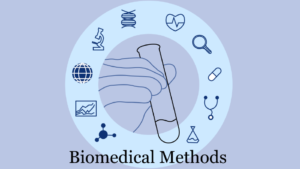
There has been tremendous growth in the scale and complexity of biomedical data in the past decade, creating new challenges for analyzing such big data. The focus of this Special Issue will be focused on recent advances in algorithms and analysis tools in biomedical informatics with an emphasis on emerging data types and technologies. It will feature the extended version of some of the best papers selected from ACM BCB 2019. The Special Issue will be open only to invited papers from ACM BCB 2019.
AI and 5G empowered Internet of Medical Things
Submission Deadline: 31 Dec, 2020
The Internet of Medical Things (IoMT), 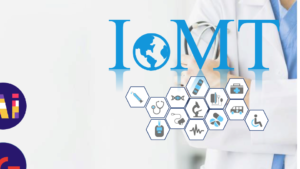 which includes medical devices, wearable devices, sensors and apps, is a critical piece of the digital transformation of healthcare, as it allows new business models to emerge and enables changes in work processes, productivity improvements, cost containment and enhanced customer experiences. IoMT can help monitor, inform and notify not only care-givers, but provide healthcare providers with actual data to identify issues before they become critical or to allow for earlier invention. While IoMT offers enormous benefits, the ubiquitously connected devices also pose new challenges. On the one hand, there has been a great improvement in cyberinfrastructure in the era of Industry 4.0, which enables high-frequency long term observational medical data being collected with the help of IoMT. How to convert these data into relevant critical insights that can then be used to provide better care poses a great challenge. On the other hand, although IoMT applications can run well on exiting wireless communication technology, i.e., 4G LTE, there will be others in the future that will require single-digit milliseconds latency and massive bandwidth such as telesurgery. To tackle these challenges, integration AI and 5G into IoMT may achieve an elegant breakthrough in terms of seamless interoperability, low cost, high speed, and low latency, and increased efficiency. Considering the benefit of AI and 5G for IoMT, various AI/5G empowered frameworks/architectures/systems for smart healthcare have been proposed. Even though these approaches have achieved certain success, there exist various scientific and engineering challenges. These open issues call for extensive attention from both academia and industry.
which includes medical devices, wearable devices, sensors and apps, is a critical piece of the digital transformation of healthcare, as it allows new business models to emerge and enables changes in work processes, productivity improvements, cost containment and enhanced customer experiences. IoMT can help monitor, inform and notify not only care-givers, but provide healthcare providers with actual data to identify issues before they become critical or to allow for earlier invention. While IoMT offers enormous benefits, the ubiquitously connected devices also pose new challenges. On the one hand, there has been a great improvement in cyberinfrastructure in the era of Industry 4.0, which enables high-frequency long term observational medical data being collected with the help of IoMT. How to convert these data into relevant critical insights that can then be used to provide better care poses a great challenge. On the other hand, although IoMT applications can run well on exiting wireless communication technology, i.e., 4G LTE, there will be others in the future that will require single-digit milliseconds latency and massive bandwidth such as telesurgery. To tackle these challenges, integration AI and 5G into IoMT may achieve an elegant breakthrough in terms of seamless interoperability, low cost, high speed, and low latency, and increased efficiency. Considering the benefit of AI and 5G for IoMT, various AI/5G empowered frameworks/architectures/systems for smart healthcare have been proposed. Even though these approaches have achieved certain success, there exist various scientific and engineering challenges. These open issues call for extensive attention from both academia and industry.
Enabling Technologies for Next Generation Telehealthcare
Submission Deadline: 31 Jan, 2021
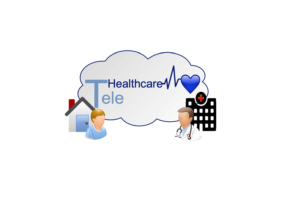
Nowadays, all over the world, the number of Information and Communication Technology (ICT) investments in health and well-being is rapidly increasing. In this context, there is a growing interest about telehealthcare that allows the provisioning of various kinds of health-related services and applications over the Internet. The main benefits of telehealthcare are: it reduces the risk of infection because patients can make use of remote healthcare services directly in their homes without the need to physically move in clinical centers; it can optimize healthcare workflows; it pushes down clinical costs; it improves the quality of life of both patients and their families. Telehealthcare solutions are typically aimed at tele-nursing, tele-rehabilitation, tele-dialog, tele-monitoring, tele-analysis, tele-pharmacy, tele-trauma care, tele-psychiatry, tele-radiology, tele-pathology, tele-dermatology, tele-dentistry, tele-audiology, tele-ophthalmology, etc. In recent years the rapid advent and evolution of emerging ICT solutions (such as Internet of Things (IoT), Cloud/Edge/Fog computing, Artificial Intelligence (AI), Blockchain, etc.) are revolutionizing the whole telehealthcare sector.
This special issue aims to attract contributions from both academic and industrial organizations focusing on the application of such an emerging ICT for addressing Telehealthcare issues.
Explainable AI for Clinical and Population Health Informatics
Submission Deadline: 24 Aug, 2020
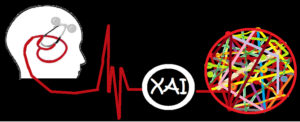 Modern medicine and healthcare have become more complex and less explainable and interpretable than ever. Artificial Intelligence (AI) and AI-based automated recommendations and actions have increased dramatically in every aspect of human life. Reliance on AI to automate disease detection, diagnosis, and prediction, and informed decision-making is also on the rise in all fields of medicine. Explainable AI addresses some of the restrictions of black-box AI systems to explain and interpret their diagnosis, predictions, and recommended actions to stakeholders. It aims to create more understandable, interpretable, and reliable models, by improving the quality of predictions.
Modern medicine and healthcare have become more complex and less explainable and interpretable than ever. Artificial Intelligence (AI) and AI-based automated recommendations and actions have increased dramatically in every aspect of human life. Reliance on AI to automate disease detection, diagnosis, and prediction, and informed decision-making is also on the rise in all fields of medicine. Explainable AI addresses some of the restrictions of black-box AI systems to explain and interpret their diagnosis, predictions, and recommended actions to stakeholders. It aims to create more understandable, interpretable, and reliable models, by improving the quality of predictions.
Multi-modal Computing for Biomedical Intelligence Systems
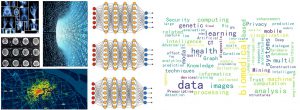 Submission Deadline: 31 January, 2021
Submission Deadline: 31 January, 2021
In recent years, the development of biomedical imaging techniques, integrative sensors, and artificial intelligence, brings many benefits to the protection of health. We can collect, measure, and analyze vast volumes of health-related data using the technologies of computing and networking, leading to tremendous opportunities for the health and biomedical community. Meanwhile, these technologies have also brought new challenges and issues. Biomedical intelligence, especially precision medicine, is considered one of the most promising directions for healthcare development. The practice of biomedical intelligence is based on the prescriptive and predictive analytics of Big data. Biomedical intelligence systems include hardware, computational models, databases, and software that optimize the acquisition, transmission, processing, storage, retrieval, analysis, and interpretation of vast volumes of multi-modal health-related data. Currently, these systems have been deployed in solutions that integrate a variety of technologies, including machine learning (especially deep learning), artificial intelligence, computer vision, Internet of Things, E-Health, bioinformatics, sensors, etc., to achieve patient-centric healthcare. It is expected that the efficiency, accuracy, predictive value, and benefits of biomedical intelligence will greatly improve in the years to come. Researchers from academic fields and industries worldwide are encouraged to submit high quality unpublished original research articles as well as review articles in broad areas relevant to Multi-modal Computing theories and technologies for Biomedical Intelligence Systems.


